The 15+ BEST Podcast Hosting Platforms (Ranked For 2024)

Aiming to start the next hugely successful podcast?
Well, with the number of podcast listeners still exploding in 2024, you need a solid game plan.
And choosing where to host your podcast is probably decision number one.
Today, we have over 20 people on staff: podcasters, YouTubers, software developers, ex-C suite executives, sales professionals, and some of the top players in the world of content. We even make over $4 million per year from just my single blog and YouTube channel. What we excel at more than anyone else is content monetization.
Our experts tested over 30 podcast hosting tools, and I used my Bachelor’s Degree in Media Technology, as well as my experience as a Marketing Director at a tech startup AND my experience growing a podcast and YouTube channel to 170,000 subscribers AND my Instagram account to 103,000 followers.
This helped us assess which podcast hosts are the best TODAY based on price, features, monetization potential, and, basically, which ones are actually worth your money.
What is the Best Podcast Hosting?
Here are my top picks for the best podcast hosting platforms:
1. Buzzsprout.
The Best Podcast Hosting Service for Beginners (Free – $24/month + $20 Amazon Gift Card).

Adam’s Take
If you’re looking for an excellent podcasting platform, I recommend Buzzsprout. They offer helpful free learning material that helps you get started and powerful tools that help you make the most out of your recorded podcasts. Their customer support is another plus when using Buzzsprout, so they are my overall #1 choice when creating a podcast.
Buzzsprout is my #1 pick for many reasons.
They’ve been a host in business since 2009 and are trusted by over 100,000 podcasters.
Plus, they’re one of the only companies that offer a free plan with unlimited team member accounts.
Buzzsprout allows you to embed a podcast player right on your website – and you can feature just one episode or a whole playlist of episodes:
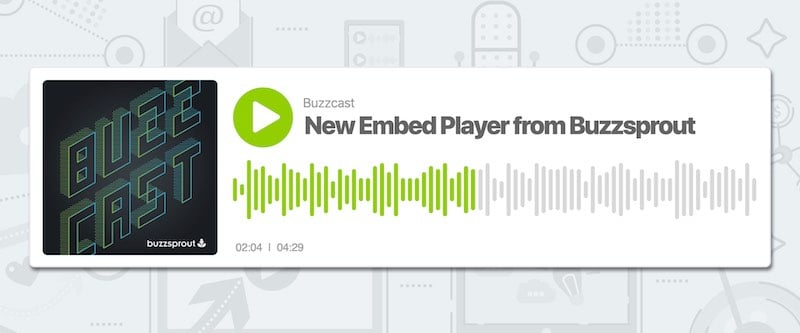
They offer an easy-to-use analytics dashboard with an algorithm that estimates how many listeners each episode receives within the first 90 days.
“They are probably the easiest tool to use right out the box and the pricing is super competitive,” said Colin Shipp, CEO of Income Growth Engine. “When I tested scheduling a new episode and uploading my audio content, I was able to finish it within just a few minutes of starting my account.”
You can also view which countries your listeners are tuning in from to help you understand your audience.
These analytics features are super helpful and better than most other tools.
Audio quality is also excellent, as you can upgrade to 128k stereo optimization for better sound.
Not only that, but they also offer podcast transcription services as an extra add-on.
Hot take: Reddit user tanam2022 uses Buzzsprout and what they love about it, stated, “It’s easy to use. I can produce visual soundbites and upload them on Instagram and YouTube to promote my podcast. Also, the customer service is great, they respond very promptly when I send a message. Buzzsprout also has great informational materials available for podcasters. Lots of reasons why I love Buzzsprout. But I also want to know what features other platforms have.”
They make it super easy to upload and schedule your podcast too.
You simply upload your audio file, change the episode title and description, and submit your podcast to all significant directories:
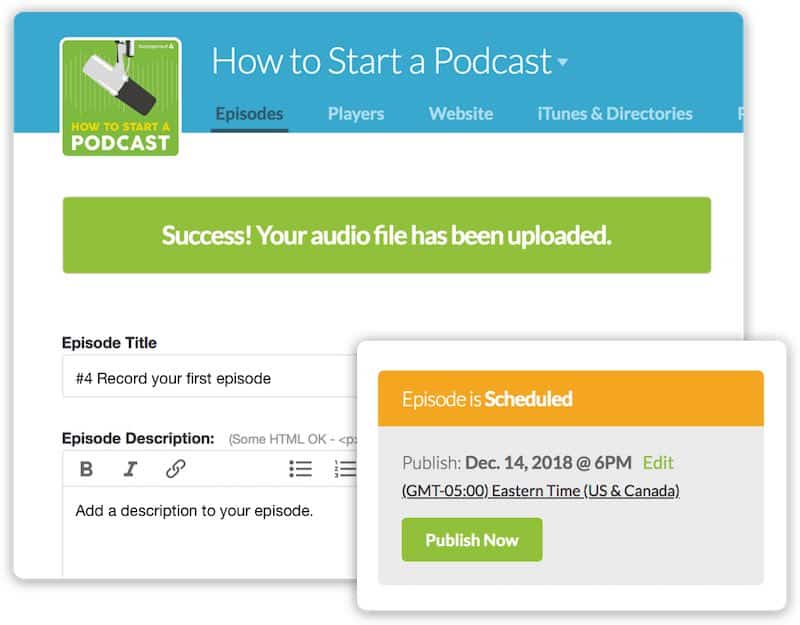
Another benefit is that you can easily add episode chapter markers.
This feature helps listeners better understand quick details about your episodes at a glance.
These aren’t required (and don’t appear on every podcast app), but are a nice feature nonetheless:
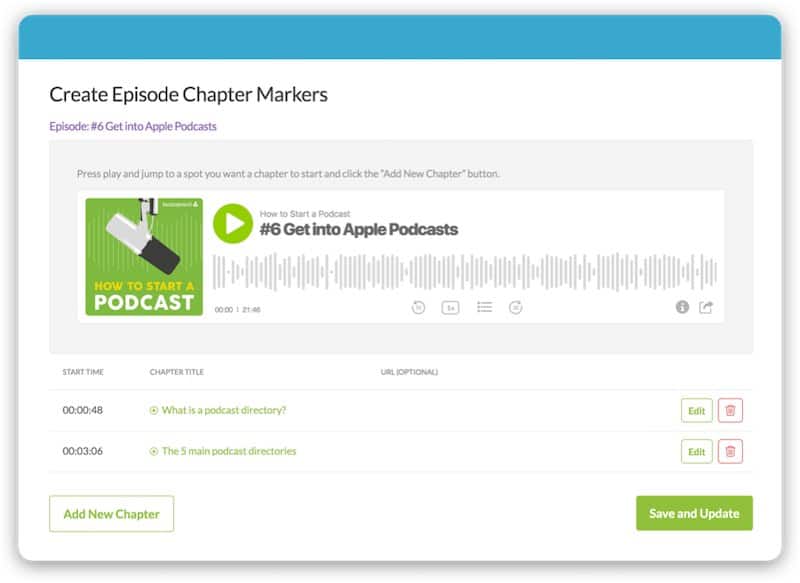
Key Features:
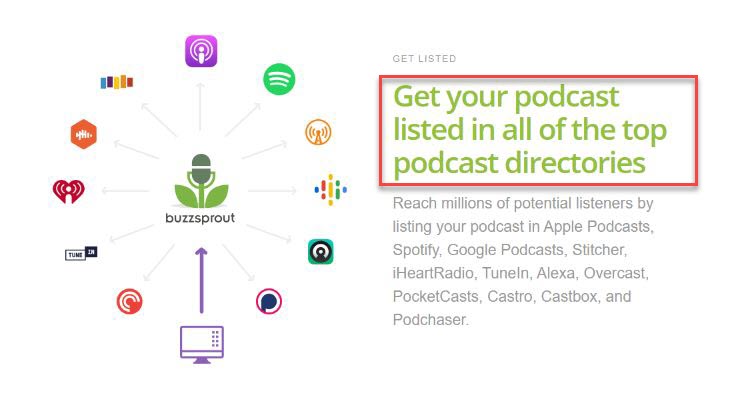
- Get your podcast listed in all top podcast directories so more people can find it.
- Advanced podcast statistics will track your progress to see how well your podcast is doing.
- Automatic episode optimization will ensure your episodes sound great and are easy to listen to.
- Dynamic content will keep your podcast fresh and exciting.
- Transcriptions make your podcast more accessible to everyone.
User Experience:
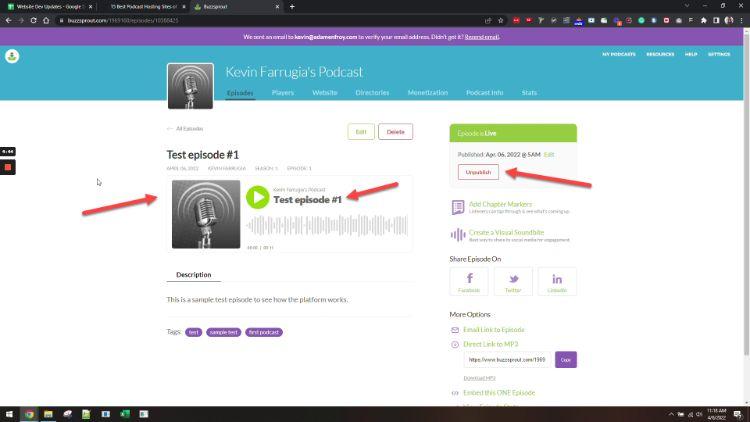
The simplicity of creating your podcast is second to none.
An excellent user interface makes it easy to get started and customize your show.
You’ll also get a breakdown of each episode, allowing you to perform various tasks such as editing and exporting.
The app also makes it easy to share your show with the world.
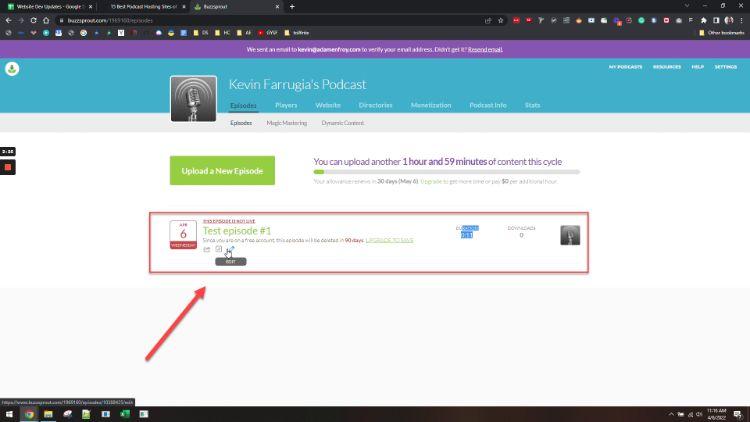
Pricing:
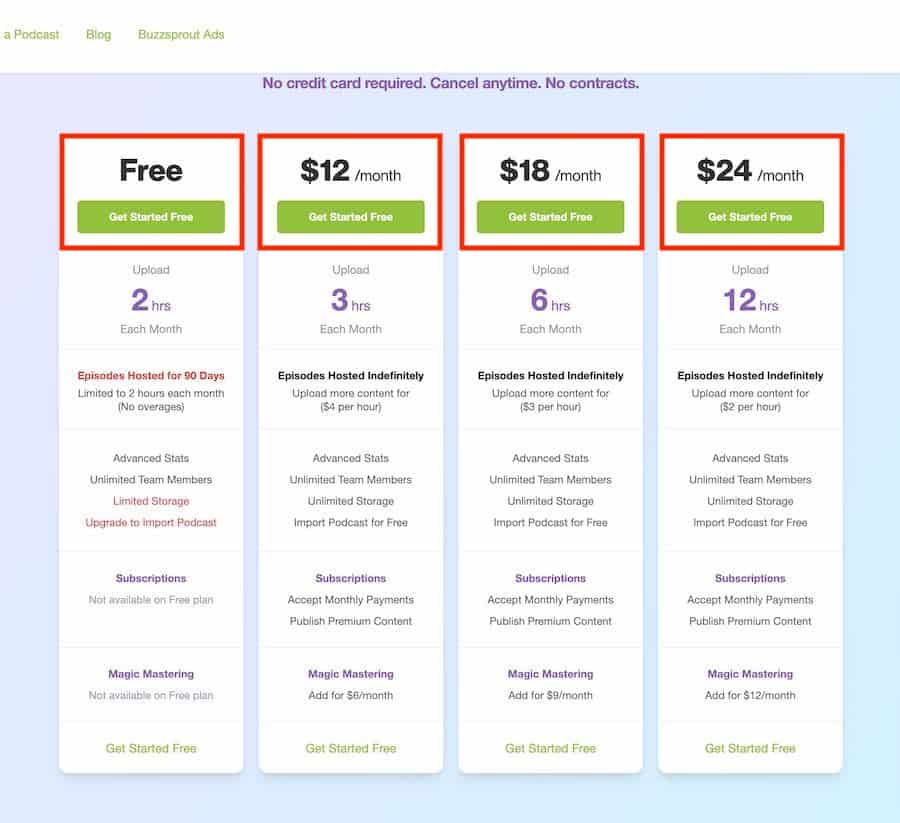
Their free plan allows you to upload two hours of content hosted for 90 days.
If you’re serious about podcasting, you can scale up and upgrade your plan based on how many hours of content you need to upload per month.
- Free: upload 2 hours each month and episodes hosted for 90 days.
- $12/month: upload 3 hours each month, hosted indefinitely, with unlimited storage.
- $18/month: features above, plus upload 6 hours each month.
- $24/month: features above, plus upload 12 hours each month.
What I Like/Dislike About Buzzsprout:
Like:
- A modest fee makes it affordable for people starting.
- Super easy to use and user-friendly.
- Excellent customer service with great support.
- Stats show you how your podcast is doing, which is excellent to help improve.
Dislike:
- Better analysis data would make it easier to understand what is working (and what’s not) on your podcast.
Product Updates:
- Updated Settings Navigation so that it’s more intuitive when creating your podcast.
- You can add host & co-host information when creating a new episode.
- Web Notifications are now possible, so you don’t miss any updates on your show.
With their month-to-month pricing and easy-to-use dashboard, Buzzsprout is my #1 choice.
I recommend you get started for free and upgrade to any plan you want based on how many hours of content you plan to upload each month.
As a bonus for my readers, when you sign up for Buzzsprout and upgrade, you get a free $20 Amazon gift card.
2. RSS.com.
Best for features.

Adam’s Take
Want to sell any of your digital work online? I think Podia is definitely a platform to consider. With the ability to sell online courses, digital downloads, host RSS.com is my go-to recommendation when it comes to three main features. If you’re looking for unlimited storage, powerful analytics, and a podcasting website that goes along with your recording, then look no further than RSS.com.
Best For
Unlimited Podcasts
Price
$4.99/mo-$8.25/mo
Annual Discount
Yes – Save 35%
Promotion
Get started with RSS.
If you’re serious about growing your podcast, RSS.com is the way to go.
This service has unlimited storage and bandwidth, perfect for more prominent podcasts.
RSS.com also offers a wide range of tools, such as episode scheduling and social media integration, making it easy for you to manage your podcast and engage with your audience.
Podcasters using RSS.com seem to appreciate the ease with which their platform enables them to get started – in fact, in just five minutes, most users can be up and running.
Hot take: Reddit user MsExxttrrrraaaa said, “RSS.com has been fabulous so far. Never had an issue getting my episodes uploaded or distributed to the listening platforms. They recently implemented a feature where it will transcribe your audio for you. It’s highly accurate and I’m impressed with it.”
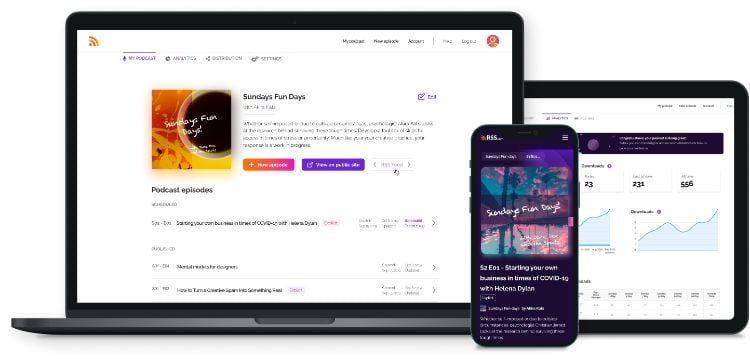
In addition to a quick and easy setup, podcasts can use RSS.com’s various partnerships to help boost their audience and find the right sponsor to meet their needs.
With unlimited downloads and episodes that one can record, RSS.com makes it easy for users to scale their podcast’s growth – even when starting from just a few episodes and getting to hundreds, or thousands, of regular listeners.
Detailed data and analytics help you dial in and tweak your podcast for maximum impact.
Such data is the key to taking your podcasting to the next level, allowing you to adapt and focus on relevant content for your audience.
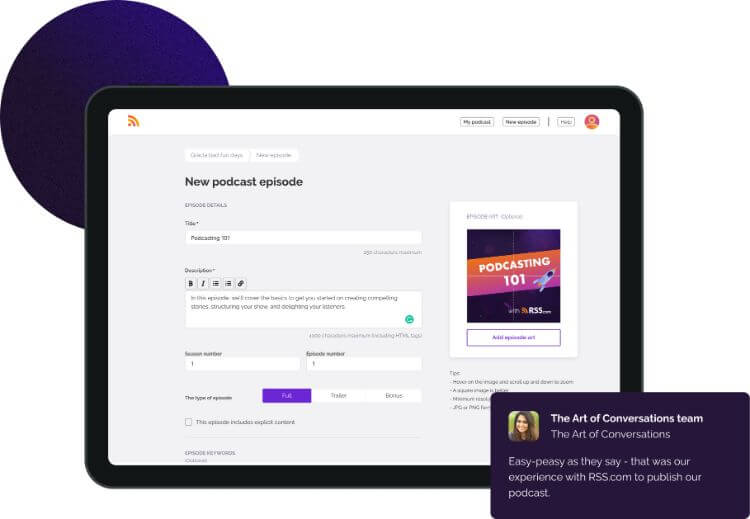
Key Features:
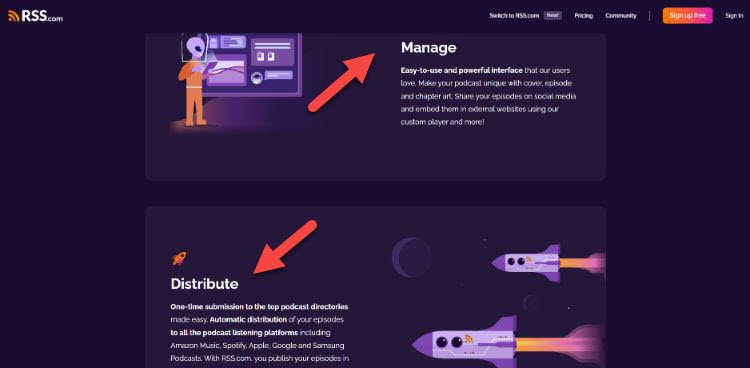

- Automatic and guided distribution to the major podcast directories, including Spotify, Apple Podcasts, and Google Podcasts.
- Monetization options include sponsorship opportunities via Podcorn and a donate button on your free public podcast website.
- There are multiple ways to monetize your podcast using RSS.com, including enabling a donation button.
- A professional-looking podcast website will give your content an added level of legitimacy, while episode transcription can make it easier for fans to follow along.
- If you are using another platform provider right now, it is seamless to export your current podcast to RSS.com and benefit from their service immediately.
- Create custom embedded players compatible with any platform, allowing you to showcase your podcast uniquely.
- With an exceptional NPS (net promoter score) of 63 and an average star rating of 4.9, podcasters are thrilled with RSS.com’s service.
User Experience:
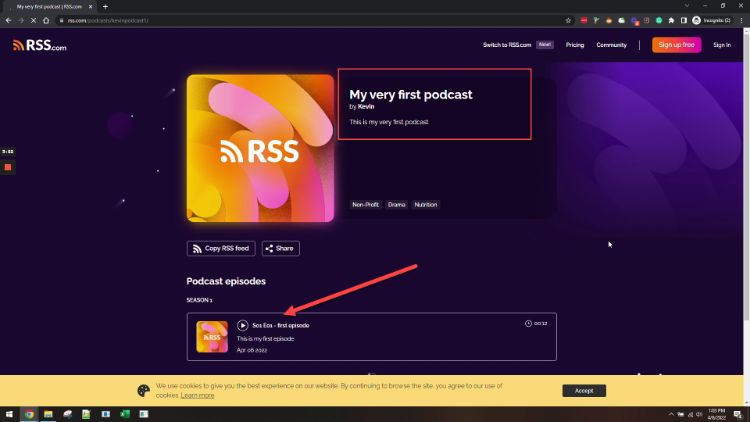

I like the way the platform creates your homepage and player.
You can easily access and manage your podcasts and see what others would see when they subscribe to your show.
Creating a podcast is straightforward, and I like that you can easily customize the settings for each episode.
You can also customize your RSS feed address, which is excellent if you want to make it easy for everyone to find your show.

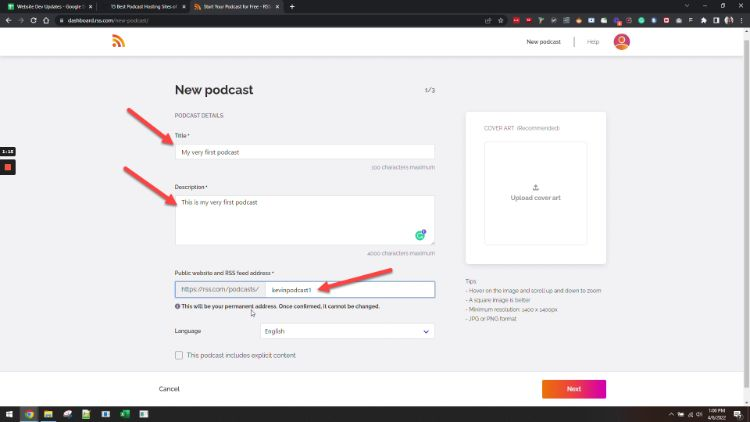
Pricing:
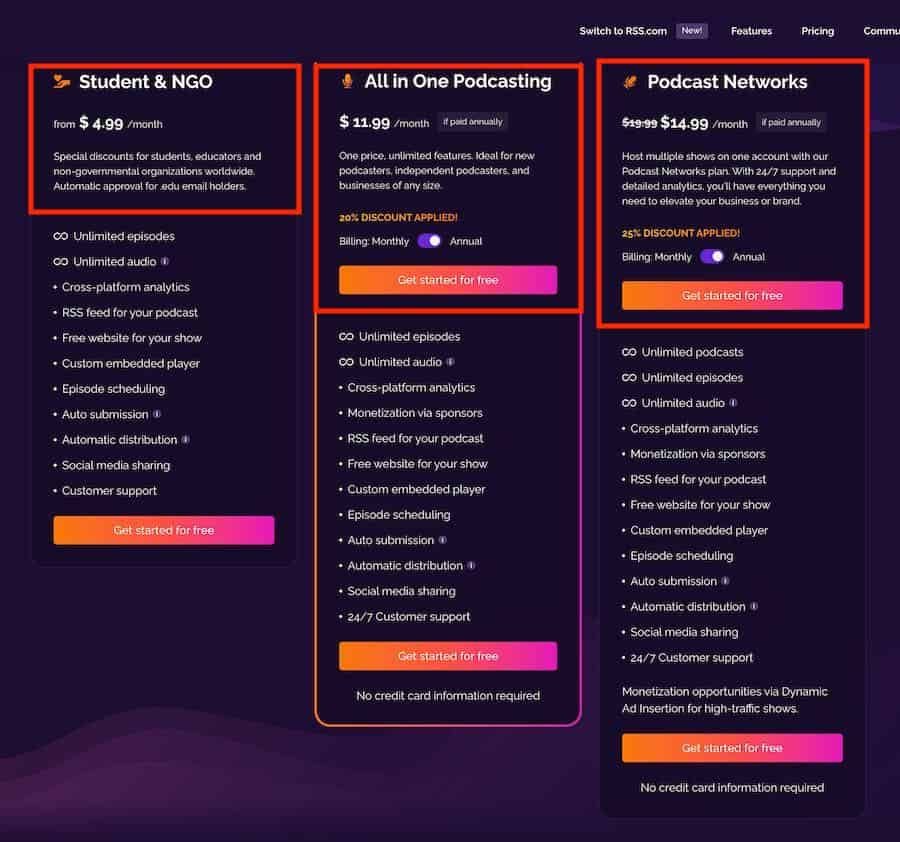
Signing up and hosting your first episode is free, allowing you to test the service without any required financial commitment or credit card.
If you’d then like to switch to their paid service, the price plans are as follows:
- Student & NGO: $4.99/Month
- All In One Podcasting: $11.99/Month
- Podcast Networks: $14.99/Month
If you have a .edu email, you’ll get automatic approval for the Educational plan.
Regarding the RSS Podcast plan, you can switch to annual billing and get a 35% discount.
Finally, if you are part of a non-profit organization, get in touch with their sales team to discuss special discounts that might apply.
There’s also a Podcast Networks plan for those who require more advanced features.
What I Like/Dislike About RSS.com:
Like:
- Super easy to spread content to various social media platforms with just a few clicks.
- Reaching out to your audience is done elegantly and doesn’t feel like spam.
- Integrates with leading podcast distributors to be sure as many people hear your show as possible.
- Easy to pull stats showing how well your podcast is doing and where your listeners are coming from.
Dislike:
- Sometimes it’s challenging to track your subscribers.
- The free version is quite limited regarding what you can do and how many shows you can have.
Product Updates:
- Sign-in flow improved, so it’s easier than ever to get started.
- New languages were added to podcast configuration, making getting your show going in the right direction even easier.
- Page loading time improved by up to 10x, so you can get the information you need faster.
✨Get an entirely free month (rather than just an episode) with RSS.com today. Use the coupon code: RSSADAM.
Get started with RSS.com.
3. Libsyn.
Best Ease Of Use.

Adam’s Take
With podcast distribution at the heart of Libsyn, creating your show and sharing it with the world has never been easier. It’s probably one of the simplest things you can do to get your message and build an audience. Libsyn offers all the tools you need to get started, and their user interface is so intuitive that anyone can figure it out.
Best For
Ease Of Use
Price
$5/mo-$150/mo
Annual Discount
Up To 2 Months Free
Promotion
Libsyn’s user interface is top-notch, making it easy to navigate and understand – even for first-time users.
They offer a wide variety of features that are perfect for both novice podcasters and professionals.
Libsyn’s recent addition of Libsyn Studio lets you create and record a podcast using only your computer, with no extra equipment required.
Requiring no additional equipment means that anyone can start podcasting immediately – a huge advantage for Libsyn.
They also offer various ways to offer subscriptions, run ads, and monetize your podcast.
If you want to share your knowledge about a topic while building a community around your show, then Libsyn is a great platform to consider.
Hot take: Reddit user JabberBjorn stated, “I’ve been with Libsyn for over 10 years. They are not the cheapest (considering some options are free), but they are always improving the service (e.g. like the different platforms you can easily go out to).”
Key Features:
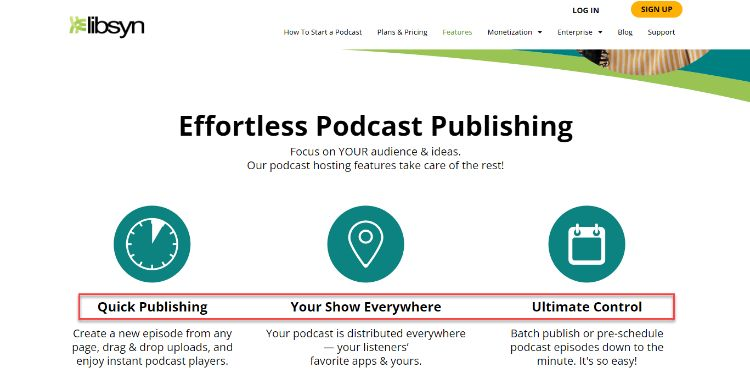
- Advanced stats provide detailed information about your audience and their interaction with your show.
- The social promotion scheduler makes it easy to share your episodes on social media and reach a larger audience.
- Unlimited bandwidth means you can upload as many episodes as you want without worrying about exceeding your limit.
- The ad-free podcast website gives you a professional look and feels without the hassle of dealing with ads.
- The custom podcast player lets you customize the look and feel of your player to match your brand.
- Podcast monetization allows you to run ads on your show and earn revenue from your episodes.
User Experience:
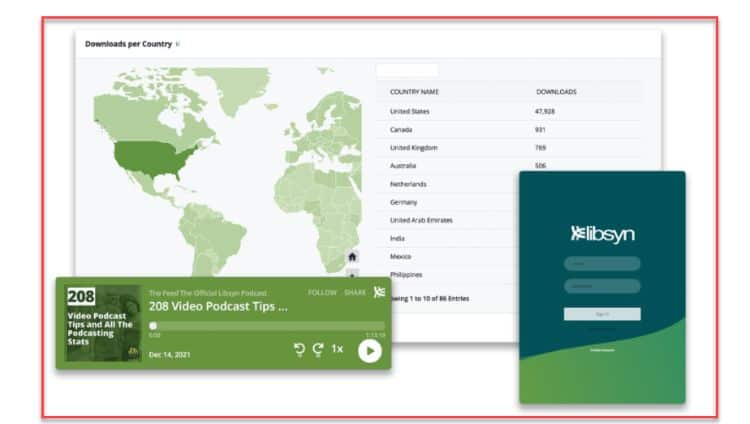
Libsyn has finally released its new user interface, Libsyn5, to all users.
This makes navigating the platform easier and finding the features you need.
The new interface is clean, modern, and easy to use – even for first-time users.
Pricing:
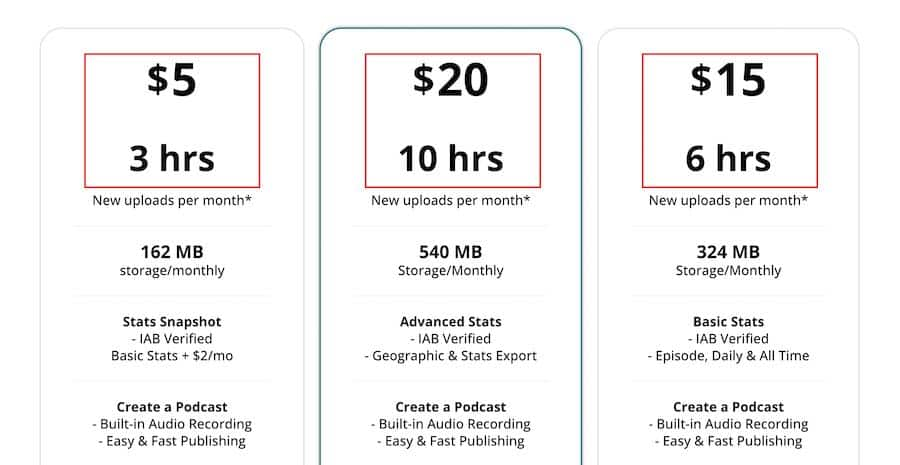
Based on the number of hourly uploads per month, you can choose from the following plans:
- 3 hours: $5
- 6 hours: $15
- 10 hours: $20
- 14 hours: $40
- 27 hours: $75
- 55 hours: $150
What I Like/Dislike About Libsyn:
Like:
- Libsyn is easy to contact and happy to help with responsive customer service.
- Regarding posting options, there are various ways to share and schedule your content.
Dislike:
- There is no free trial you can use to test out the platform before committing to a paid plan.
Product Updates:
- New social scheduling features help you promote your episodes on social media even better.
Get started with Libsyn.
4. PodBean.
Best For Hosting ($29/Month + 1 Month Free).
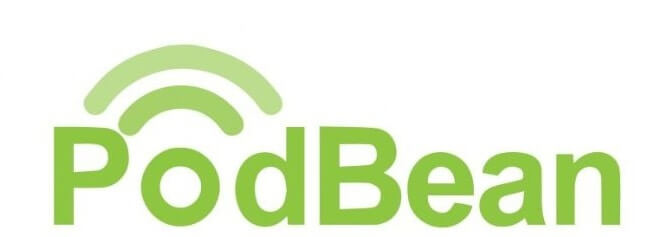
Adam’s Take
Podbean makes setting up and monetizing your podcast as easy as can be. I love that newbies and professionals can use this platform to find the podcasting success they’re looking for. You can even use your phone to start sharing your message with the world in just a few clicks. I also like that they provide a podcasting website with every account, so your audience can easily find your content online.
Best For
Easy Creation
Price
$0/mo – $99/mo
Annual Discount
Yes – Save 23%
Promotion
PodBean has been in the podcasting hosting space for over ten years, hosts 540,000 podcasters, and is the easiest-to-use host on this list.

Key Features:
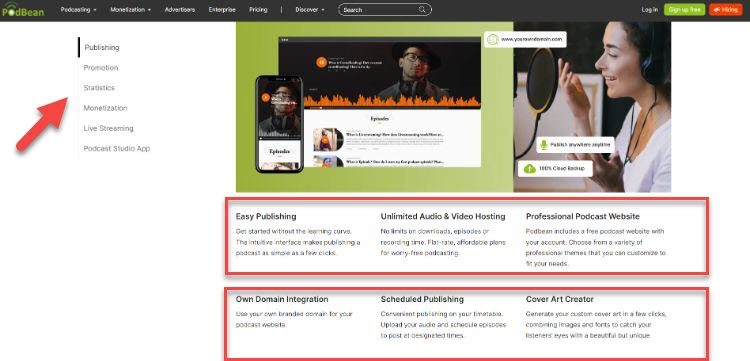

- Five hours of storage on the free plan.
- Unlimited storage on the $9/month plan.
- Dynamic ad insertion.
- Patreon program to accept recurring revenue from listeners.
- Auto-uploads to YouTube.
- Mobile app.
- Auto-posting to social media like Facebook and Twitter.
User Experience:
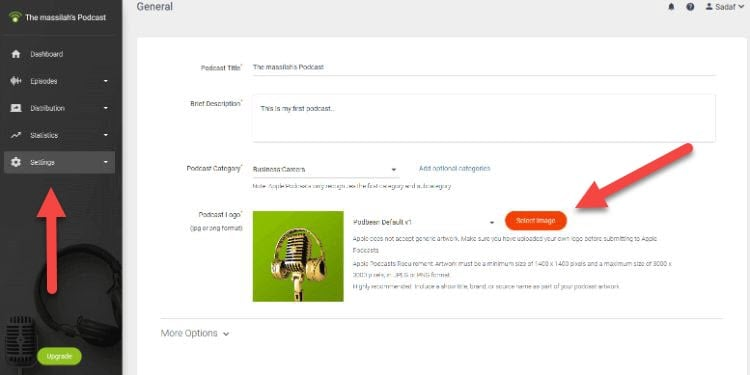
The user experience on Podbean is relatively straightforward, with the commonly seen left-hand side menu giving you access to all the features you need.
Creating a podcast is very simple, and you can even import existing audio files if you want to.
You can choose a different podcast logo, use the default one, and change the color scheme to match your brand.
One reddit user LalaCalamari mentioned, “I’ve been using Podbean for a few years now. Haven’t had any issues and works well for what we need.”
User mnowax followed up with, “I second PodBean. It’s a little costly but worth it for us.”
Finally, the stats overview screen gives you a good idea of your podcast’s performance and where to focus your efforts.

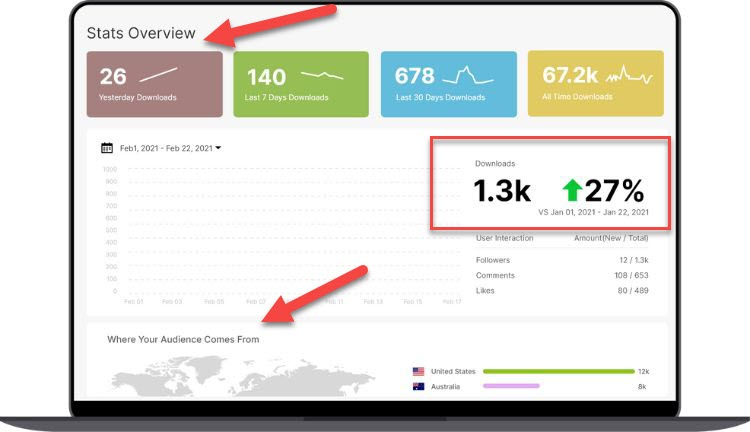
Pricing:
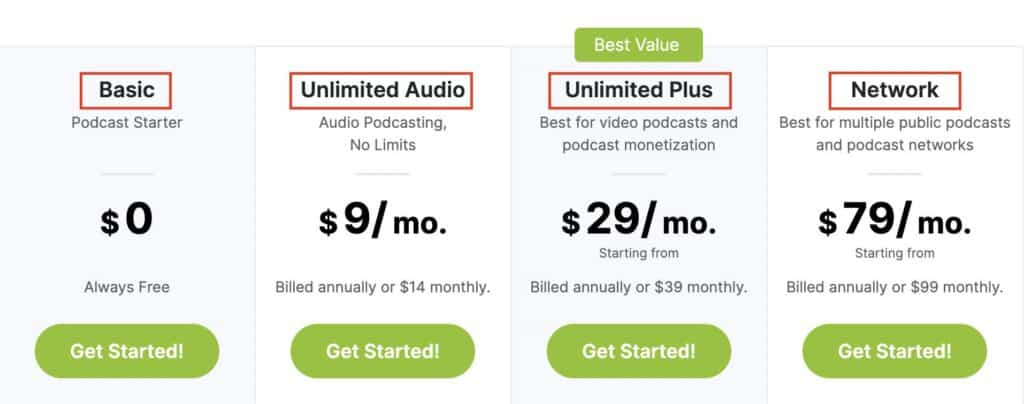
- Basic (Free and Open-Source): 5 hours of storage and 100 GB monthly.
- Unlimited Audio ($9/month): Unlimited storage and bandwidth, pro themes, advanced design, and ad marketplace.
- Unlimited Plus ($29/month): Features above, plus Patreon program and dynamic ad insertion.
- Network ($79/month): Features above, plus multiple domains, private podcasts, advanced statistics, and live chat support.
I recommend podcasters serious about running their professional show get their $29/month PodBean Unlimited Plus Plan, as you get unlimited audio hosting and video storage.
What I Like/Dislike About PodBean:
Like:
- A short podcast hosting provider that makes it easy to get your show online.
- No downtime and fast downloads mean your listeners can always hear your latest episode.
- Upload video and audio podcasts with just a few clicks, making it easy to get started.
- Easy to distribute shows to a broad audience, thanks to integrations with major podcast platforms.
Dislike:
- Image dimensions and best practices are lacking in creating covers and episode art.
- The dashboard can be customized more so it’s easier to find your needed information.
Get started with PodBean.
5. Spreaker.
Best Content Management System (Free – $120+).

Adam’s Take
Spreaker is one of the best content management systems for podcast hosting. It’s simple to use and has many features that make it perfect for podcasters of all levels.
Best For
Content Management
Price
$0-$120/mo
Annual Discount
Yes – Save $398/yr
Promotion
Spreaker is a one-stop shop for podcasters.
From newbies just getting started to publishers developing tons of content, Spreaker has a solution for making any podcaster’s journey smooth and profitable.
The podcasting platform connects listeners, podcast creators, and advertisers in one place (web and mobile apps).
It makes it easy for any content creator to monetize their entire podcast catalog.
Key Features:
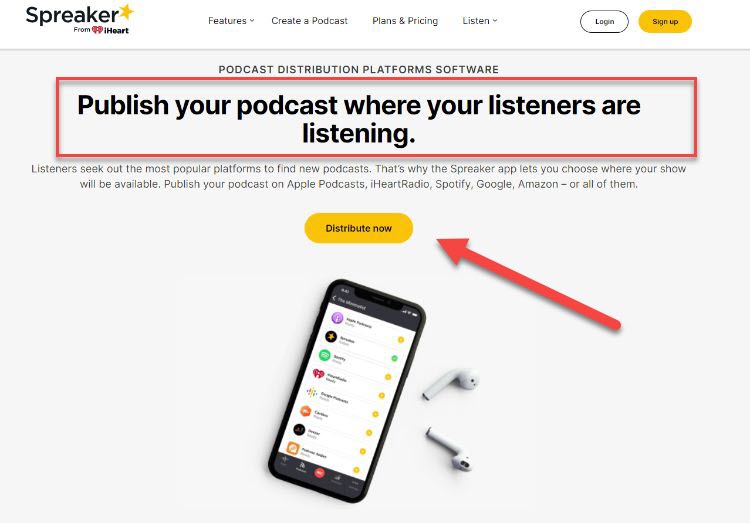
- Content management system – allows podcasters of any “level” to automatically enable the distribution of new episodes to the major listening platforms (Apple Podcast, Spotify, Google Podcast, iHeartRadio, Alexa, Deezer, etc.)
- Manage and schedule multiple podcasts under the same account and to
- Strategically set your monetization (provided via dynamic ad insertion) at the episode and show level.
- Team management features and can add collaborators.
- Statistics certified by the IAB.
User Experience:
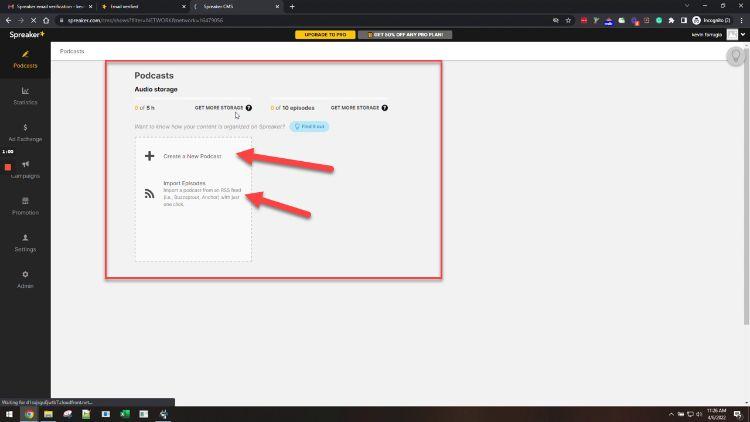
The left-hand side menu is excellent to navigate, and the overall design is user-friendly.
Creating a podcast is quick and easy; you can integrate it with your existing blog or website.
The app also tracks your progress and gives detailed insights into your show’s performance.
There’s also a promotion feature that lets you share your show with potential listeners and market your show to a broader audience.
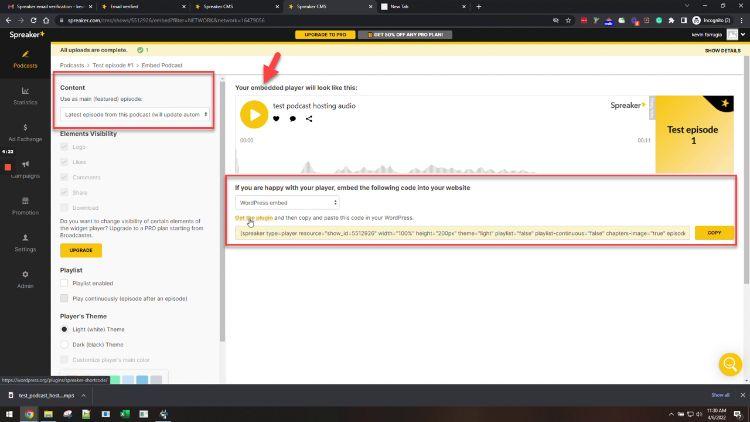
Pricing:
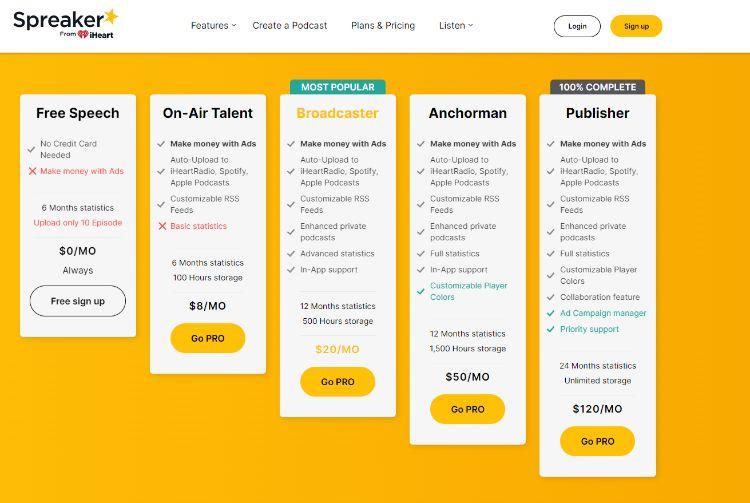
- Free Speech (Free): 5 hours of audio storage, up to 10 episodes.
- On-Air Talent ($8/month): 100 hours of storage.
- Broadcaster ($20/month): 500 hours of storage.
- Anchorman ($50/month): 1,500 hours of storage.
- Anchorman ($120/month): Unlimited storage.
Their most popular plan is the Broadcaster Plan at $20/month.
With that plan, you get 500 hours of audio storage, advanced stats, and monetization features.
As a bonus, with my Spreaker affiliate link, you get one month completely free, and the price adjusts accordingly:
What I Like/Dislike About Spreaker:
Like:
- An incredible slate of features makes it easy to create and share a podcast with the world.
- The All-in-one platform and its ease of use mean you don’t need multiple tools to get your podcast online.
- Customer service is rapid, and they are always happy to help out.
- It is easy to find other shows sorted by category and topic, making it easy to find new content.
Dislike:
- You begin to pay a higher rate once you reach a certain number of downloads which could be a turnoff for some people.
- On a few occasions, some glitches prevented a show recording from being uploaded.
Product Updates:
- Schedule episodes straight from your phone so you never miss a beat!
- Podcast categories had a refresh, so it’s even easier to find the right show.
- One-click distribution means your podcast is live in minutes in all the places.
As a bonus, my readers get one month of 90% off Spreaker.
6. RedCircle.
Best For Monetizing Podcasting Content.

If you’re a podcaster wanting to grow your podcast, reach a bigger audience, and make money doing it, then RedCircle is your platform.
You can also make money from your podcast by using the ad platform to sell subscriptions, receive donations, and do cross-promotions with other shows.
The ability to customize and control your content to the full extent is what makes this one of the best platforms for podcasters.
You can release your content when you want, how you want, and to whomever you want.
There are no contracts or exclusivity when it comes to your content.
On the other hand, for brands and agencies wanting to launch or grow their advertising campaigns, Redcircle allows them to scale quickly and reach a larger audience while spending smarter.
Check out this RedCircle review for more information about this platform.
Key Features:
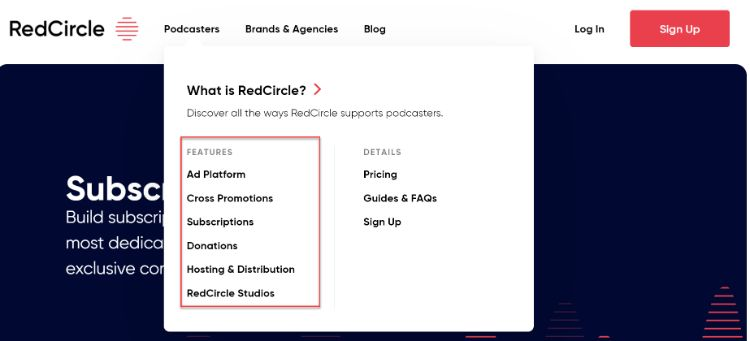

- Innovative tools to grow your podcasts help you succeed
- All-in-one platform to host, distribute, and monetize your content
- Accept one-time and recurring donations so you can keep your show going
- Build subscription revenue to ensure long-term success
- Cross-Promotion Marketplace that lets you connect with other shows to grow your audience
User Experience:
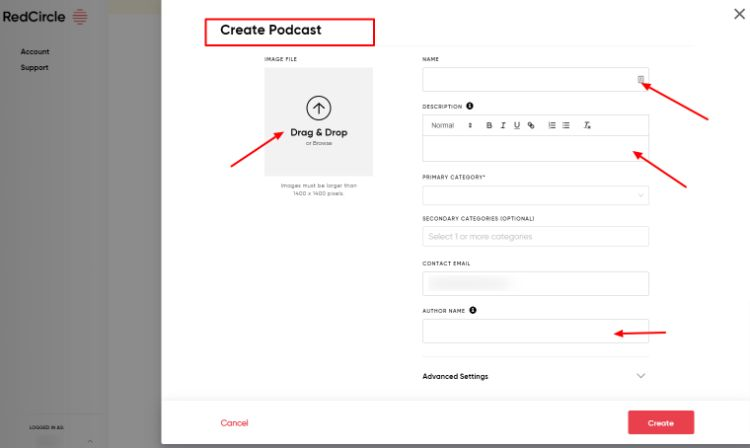

You can start using RedCircle for free to host and distribute your content by filling in a short form.
The platform is very user-friendly and easy to use.
You can find all the features and options you need in one place without having to search for them.
Then you drag and drop a cover image of the given size, and your first podcast will be live.
The interface is designed so that you can easily find your way around and use all the features without any problem.
Pricing:
RedCircle offers a core plan that allows unlimited hosting and distribution, subscription donations, and more.
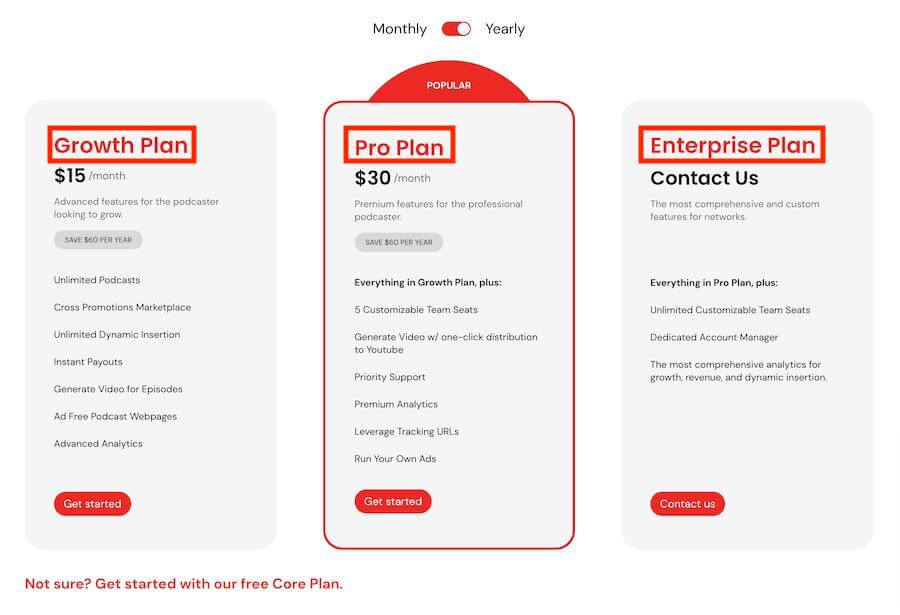
After that, there are two paid plans as follows:
- Growth Plan: $9 per month
- Pro Plan: $30 per month
- Enterprise Plan: Contact them for more information
These are both paid annually and offer a saving of up to $60 per year.
There are also monthly plans available if this is something you’d prefer.
There’s also a free 7-day trial on the paid plans.
What I Like/Dislike About Redcircle:
Like:
- UI is modern and easy to use, making podcast creation and distribution a breeze
- Switching over from another provider is an easy process
- The platform offers excellent insights and analytics to help you measure and grow your podcast
Dislike:
- Once submitted, some things can’t be changed in your podcast settings (e.g., title, description)
Product Updates:
- Updates to the ad platform and its user interface to make it even easier to use
Get started with RedCircle.
7. Transistor.
Best Built-In Podcast Analytics ($19.99/month).
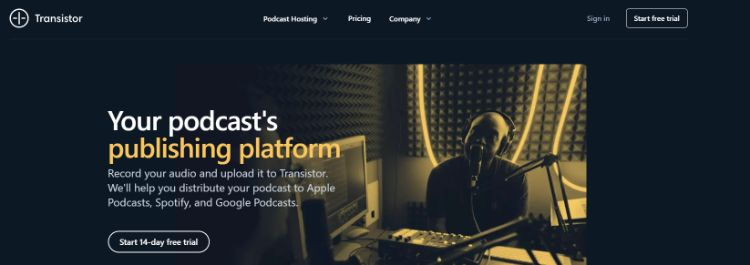
Transistor.fm is a high-quality, professional service that hosts popular podcasts, including Drift, Honeybadger, and Cards Against Humanity.
They are known to provide their podcasters with built-in analytics and absolutely everything you need to grow your podcast audience.
Key Features:
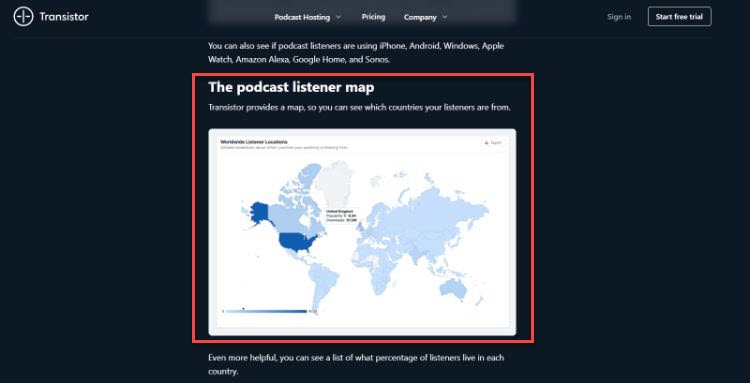

- Host unlimited shows.
- Manage multiple users per account.
- Generate branded websites with your domain name
- Distributing your podcast to major networks.
- View advanced analytics and reporting.
Their analytics tools are where they stand out.
Their dashboards show you trends and stats like average downloads per episode, the number of subscribers, and downloads over time.
Using another hosting platform like Libsyn or Anchor, you can easily import your existing feed into Transistor with simple migration tools.
User Experience:
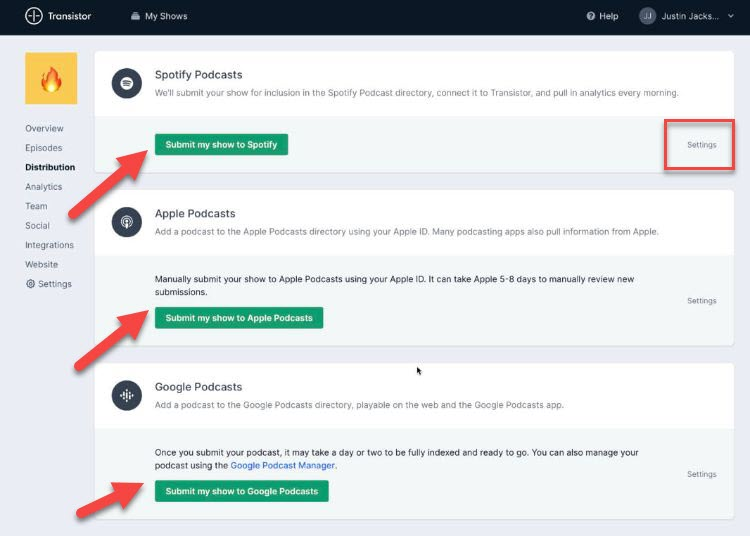

Transistor is excellent when it comes to submitting your show to various platforms.
The app makes it easy to share your show with the world.
There are also various integrations that you can use to promote your show and get more listeners.
Moreover, the bar graph design on the stats screen makes it easy to track your progress and see your show’s performance.
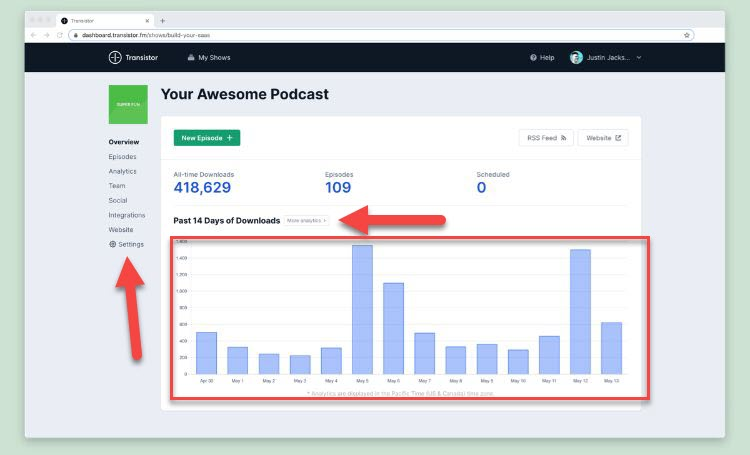

Pricing Plans:
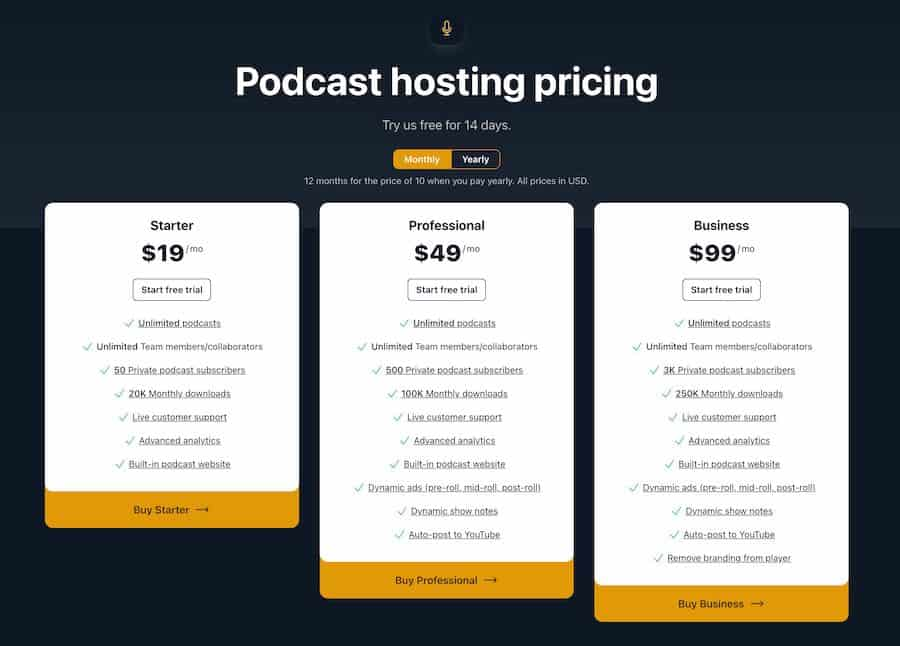
- Starter Plan ($19/month): Provides unlimited podcasts and episodes, up to 2 users, and 10,000 downloads per month.
- Professional Plan ($49/month): Everything in the starter plan, but now with up to five team members and 50,000 downloads per month.
- Business Plan ($99/month): All features in the previous plans, but with up to 10 team members and 150,000 downloads per month.
Transistor allows you to scale your podcast (and pricing) as your audience grows.
Ultimately, your plan choice will likely depend on the monthly downloads you need, so you can get started with their Starter Plan and upgrade when needed.
What I Like/Dislike About Transistor:
Like:
- Support for various platforms means you can quickly get your show out there.
- Many long-time users love the simplicity and user-friendliness of Transistor.
- It gives you good analytics to track your progress and see where your listeners are coming from.
- The interface is easy to understand and makes it easy to get started.
- Priced based on the number of downloads you receive, making it more affordable for people starting.
Dislike:
- Sometimes, customer service is slightly unresponsive when it comes to helping out.
Product Updates:
- Add pages and links to your podcast website to give your listeners more information about your show.
- Use the new podcast website template to create a website that looks great and is easy to navigate.
- Display custom episode images on your podcast website so listeners can see what each episode is about before listening.
If you take podcast analytics seriously, start your 14-day free trial of Transistor (and get two months free when paid annually).
8. Simplecast.
Industry-Leading Features Powering Top Brands ($15/Month).
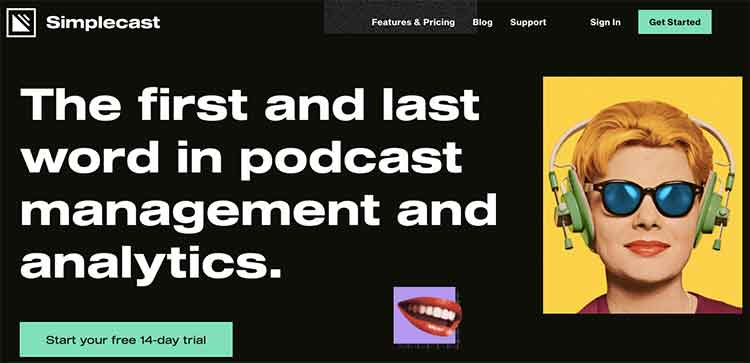
Simplecast is known for its industry-leading features, starting at just $15/month.
They live up to their name and state on their website:
“From your first listener to your first million, Simplecast provides powerful tools needed to manage, distribute, share, and grow your podcast.”
Simplecast has been around for over six years and powers some of the largest podcast brands, including Kickstarter, Nike, Facebook, and HBO.

Key Features:
- One-click publishing.
- Multiple web players and podcast players.
- A fully-functioning website.
- Advanced analytics tools.
- Collaborate with multiple team members in one account.
One standout feature is their Recast™ tool, which allows you to schedule and share podcast clips on social media. Here’s an example of that feature from The Pilot Podcast on Instagram:
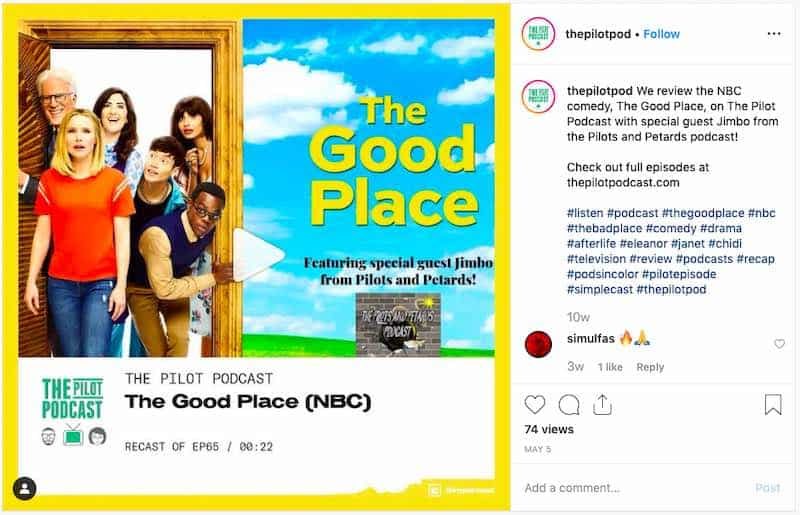
Pricing:
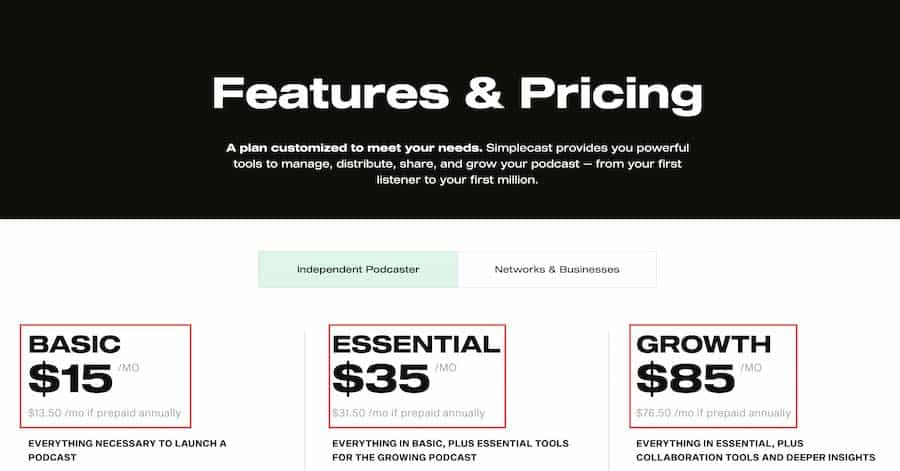
- Basic Plan ($15/month): Unlimited storage and uploads, two member accounts, customizable show website, 20k downloads per month, an embeddable web player, and email support.
- Essential Plan ($35/month): All basic plan features, plus two extra user seats, additional web players, location (country and state/region), technology (apps, browsers) analytics, 50k downloads per month, and the addition of chat support.
- Growth Plan ($85/month): All features of previous plans, plus five more extra user seats (9 total), ISP analytics, detailed metro area location analytics, and 120k downloads per month.
Ultimately, the Basic Plan will work out for you just fine if you’re starting.
While the analytics tools are excellent, you only need to upgrade if you need more users or downloads per month.
For an industry-leading podcast hosting service on a budget, get started with a 14-day free trial of Simplecast.
9. Captivate.
Best for Marketing and Growing Your Audience ($19/Month).
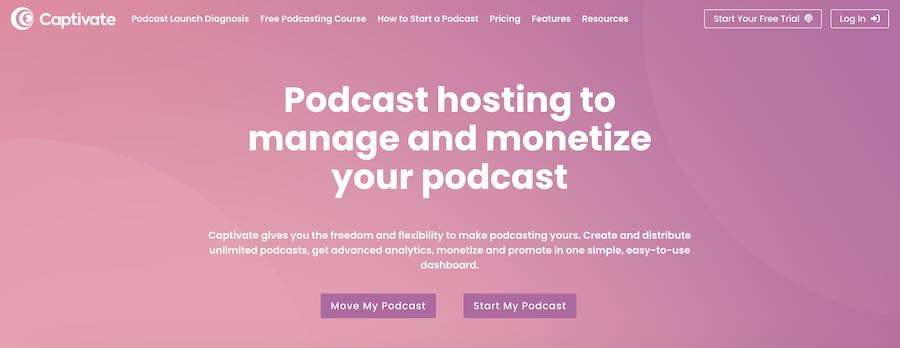
Captivate is a brand new podcast host hyper-focused on growing podcast audiences.
They were created by Rebel Base Media, which also runs Podcast Websites.
This new addition is their best product yet, as they took everything they learned from years of podcast experience and putting into one new podcast hosting service.
Hot take: Reddit user NightShiftAndrea, who manages three of her own podcasts, stated, “Captivate is my favorite. I work for a network that has been using Libsyn for years, and it’s fiiiine, but I don’t love their support. I also work for a different smaller network that uses Acast, and they haven’t had any complaints, but I think Captivate is the most user-friendly of the ones I’ve used, and I’ve never had any issues. Really like their WordPress integration, if that’s something you’re looking for.”
Key Features:
All plans come with unlimited podcasts, unlimited team members, a new podcast player, advanced analytics, and marketing tools.
A few standout growth features are their automatic podcast website and built-in calls to action.
Every plan comes with a customizable, mobile-friendly website with donation support built-in.
Second, you can build your email list and generate new leads with podcast player calls to action.
For example, if someone is listening to your podcast player, they can sign-up directly to your email list via an opt-in form.
Captivate is also constantly upgrading its analytics software.
They work with the Interactive Advertising Bureau (IAB) to create more insightful intelligence to monitor the performance of your show.
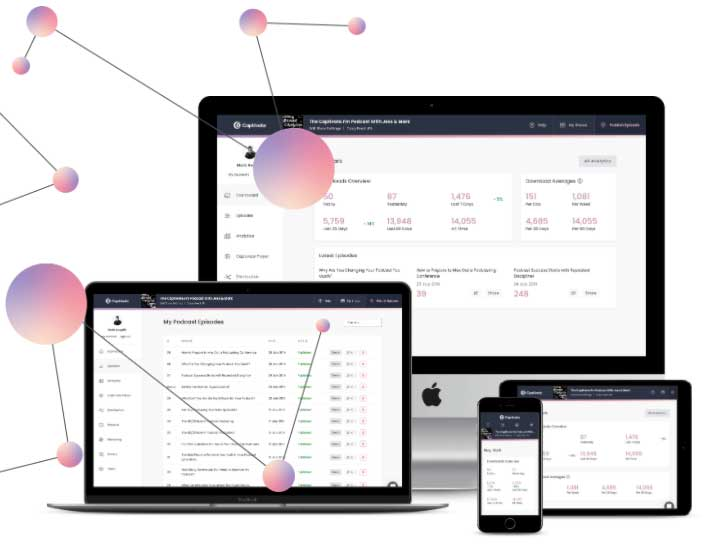
You can also easily import your show from another podcast host like Blubrry with a straightforward import tool. Their podcast marketing tool allows you to automatically generate links to places like Overcast and Pocket Casts, which helps new subscribers find your show easily.
Pricing:
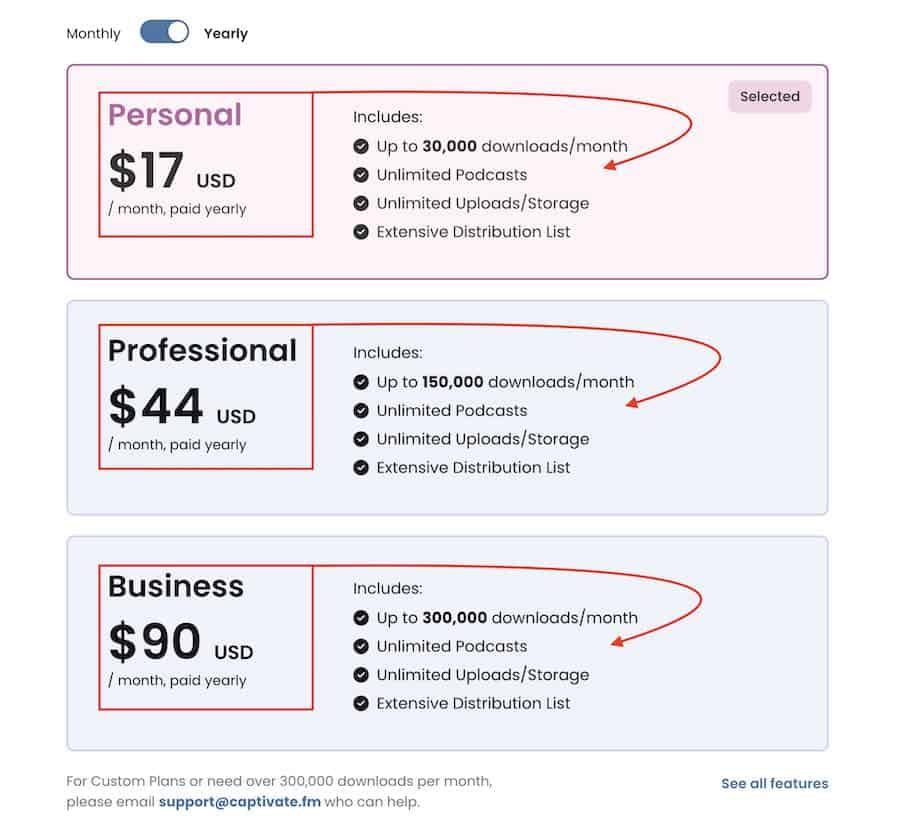
- Personal Plan ($17/month): Up to 30,000 downloads per month.
- Professional Plan ($44/month): Up to 150,000 downloads per month.
- Business Plan ($90/month): Up to 300,000 downloads per month.
With many great podcasting features in every plan and straightforward pricing that scales as you grow, Captivate will make waves as a new player in the space.
If you’re looking for a growth-oriented podcast host with many marketing features, get a 7-day free trial of Captivate.
10. Castos.
Best WordPress Podcast Hosting Service ($19/month).
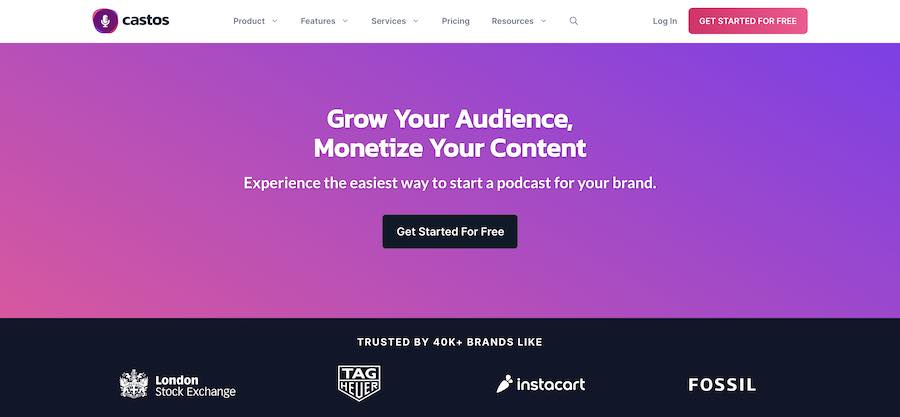
Castos is a full-featured podcasting plugin for WordPress.
If you already have a WordPress site, here’s how it works:
- You go to the Castos website and start your 14-day trial.
- Install their WordPress plugin.
- Next, when you’re ready to host your episodes, you add them to the new Podcast section inside of WordPress:
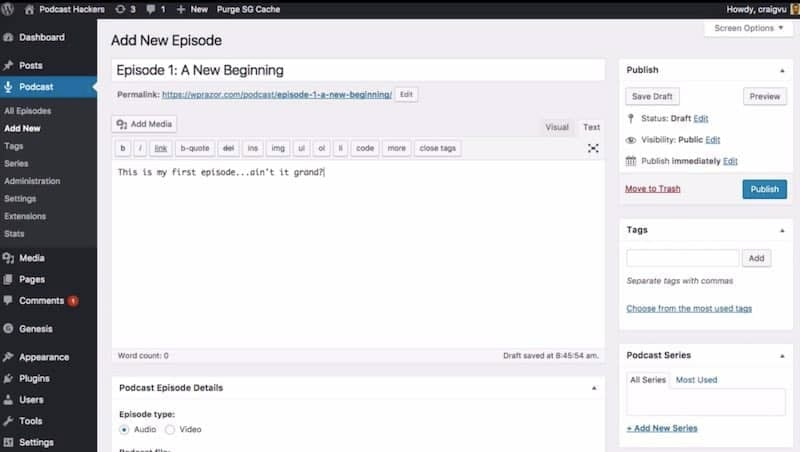
Upload your audio file, type in your description, and the podcast will go live on your site with a customizable media player:
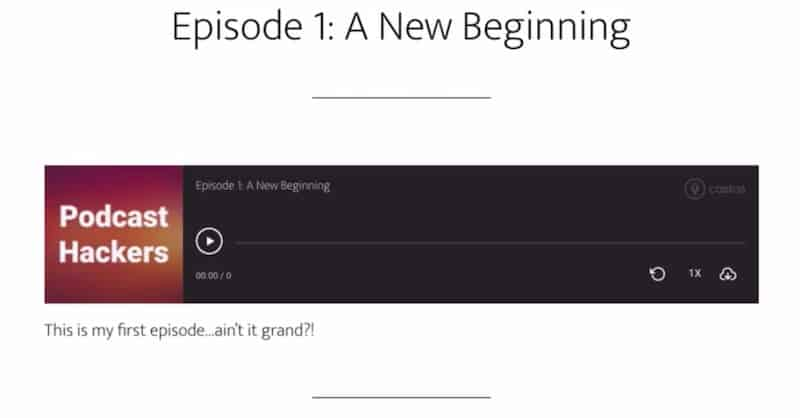
That’s it.
When you’re ready to add your podcast to directories, you grab your URL and add it to any publisher you’d like.
Key Features:
- Automatic transcription – upload your audio files, and transcriptions are added to your dashboard within minutes.
- Republish to YouTube.
- Podcast editing services by Castos Productions.
- Customizable podcast webpage.
- Podcast analytics.
Pricing:
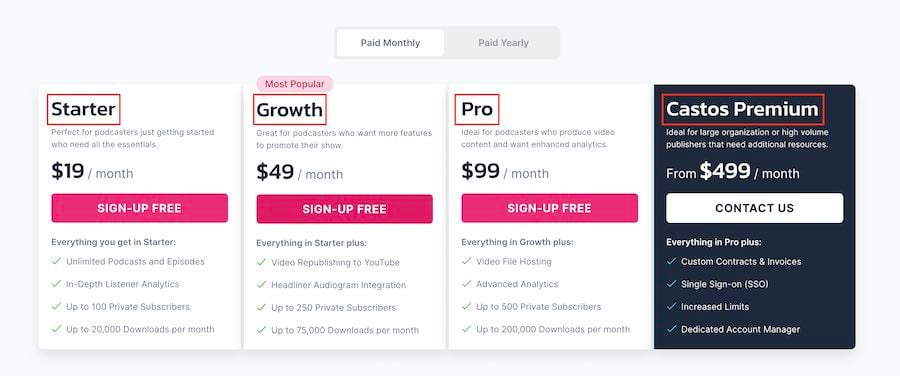
- Starter ($19/month): unlimited storage and perfect for the essentials.
- Growth ($49/month): Features above, plus YouTube republishing and custom audiograms.
- Pro ($99/month): Features above, plus advanced analytics and video file hosting.
Overall, if you’re looking for a podcast hosting service for WordPress, Castos is the best choice.
Get started with a free 14-day trial and two months free on annual plans.
11. Podcastics.
New Podcast Hosting Platform with Unlimited Episodes (Free – $39/month)
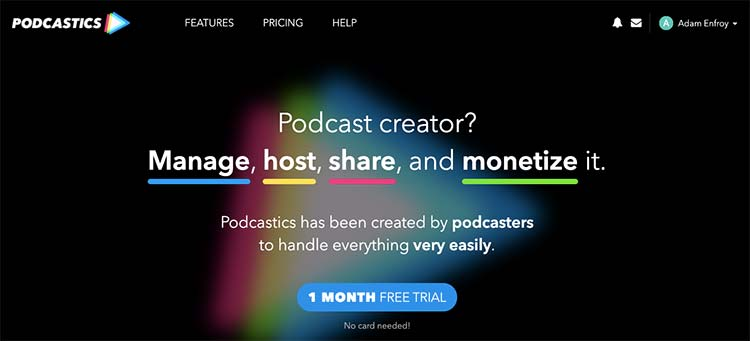
Podcastics is a new podcast hosting option that’s very easy to use and offers competitive features.
Like PodBean, their dashboard is very intuitive.
When you first start, you can set your podcast details with just a few clicks and quickly manage user permissions.
You can automatically import a podcast from Apple Podcasts or any RSS feed if you already have a podcast.
And if you’re a podcaster with multiple podcasts, you can build teams within the dashboard, which is great for studios and agencies.
Some of their other main features include:
- Podcast analytics, including plays, days and hours, sources, and locations.
- Live streaming capabilities.
- The podcast and episode editing tools.
- The ability to schedule episodes.
- Smart features like QR codes, smart links, surveys, and heat maps.
Podcastics has three pricing plans which are as follows:
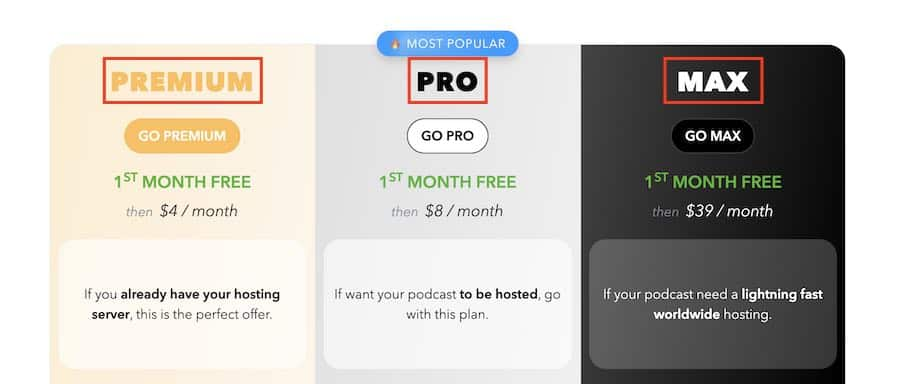
Overall, Podcastics is one of the best podcast hosting services that is super easy to use with great UX, intelligent features, and analytics.
Get started with a 30-day trial.
12. Fusebox.
The Best Toolbox of Podcasting Software (Free-$19/Month).
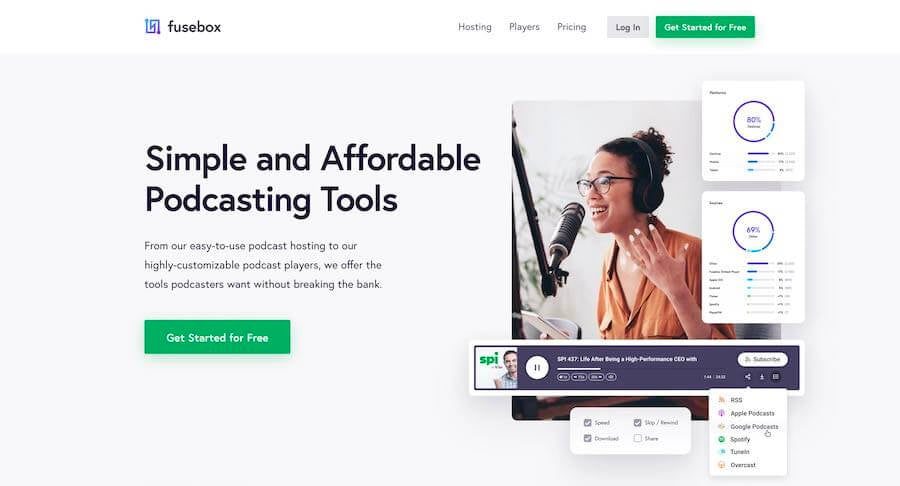
Fusebox is an excellent invention created by famous podcaster Pat Flynn of Smart Passive Income.
After years of podcasting, he was looking for the best possible podcast player for your website that your visitors will love.
Who better to create the perfect podcasting product than a prolific podcaster himself?
Fusebox has many great features, including email capture (one of the only podcast players to offer this) and other top-notch features.
They have a transcript plugin with SEO-friendly live text that automatically adds podcast transcripts to your website.
And if you’re interested in how the player works, it’s very straightforward.
You install the Fusebox WordPress plugin and add your RSS feed.
Next, you enter your subscription URLs to push your show to the major directories.
Finally, you customize the colors of your podcast player and then add the player to your posts and pages.
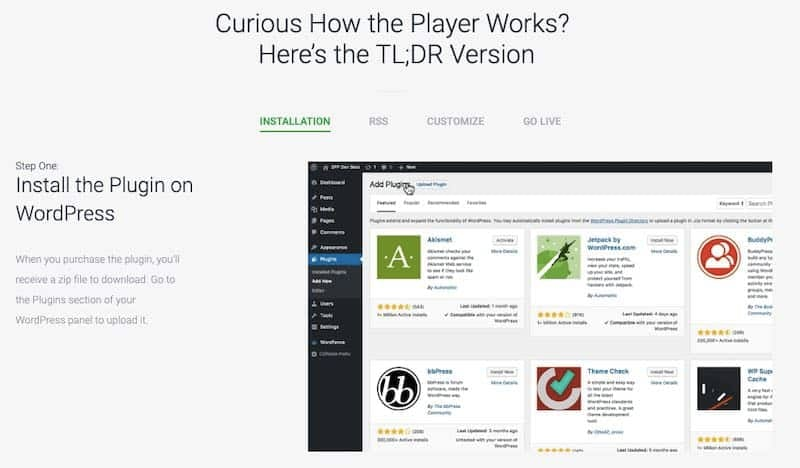
If you want to host your files, send them to podcast networks, and display them on your WordPress website, try Fusebox.
If you want to add some great podcasting tools to your arsenal, check out Fusebox.
13. Podcast Websites.
Best Podcast Hosting Platform for Website Builders ($77/month).
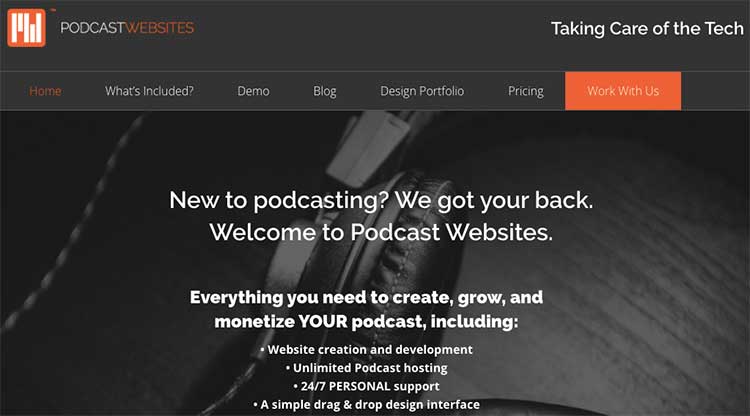
This podcast host features a simple podcasting workflow that allows podcasters access to fully responsive website hosting and security, daily backups, built-in statistics, and 24/7 support.
As a Podcast Websites member, you also receive digital marketing support to help promote your podcast, ads, and podcasting advice from real, experienced podcasters.
Their academy also features video tutorials, media, and a helpful community forum to discuss strategies with other podcasters.
Additionally, you can use Builder – a drag-and-drop website builder with themes unique to podcasters. These themes are mobile-friendly, and you can add landing pages when you market your podcast.
Podcast Websites is one of the best podcast hosting services, hands down, and you can use my coupon code HOSTME to get $10 off per month for life.
14. Audioboom.
Best for Dynamic Ads and Monetization ($9.99/month).
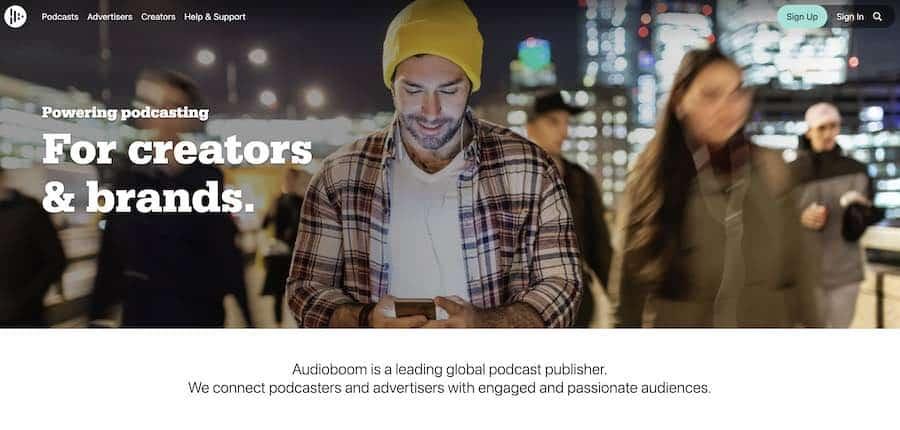
Audioboom is a popular site with simple hosting, distribution, and an embedded player.
What they’re primarily known for is their help with podcast monetization.
Once you hit 10k plays per episode, they provide tools to create dynamic ads and sponsorships for your show.
Some other features include an embeddable player with social media integrations and analytics broken down by geographic region, app, and device.
To get started, their $9.99 plan gives you the following:
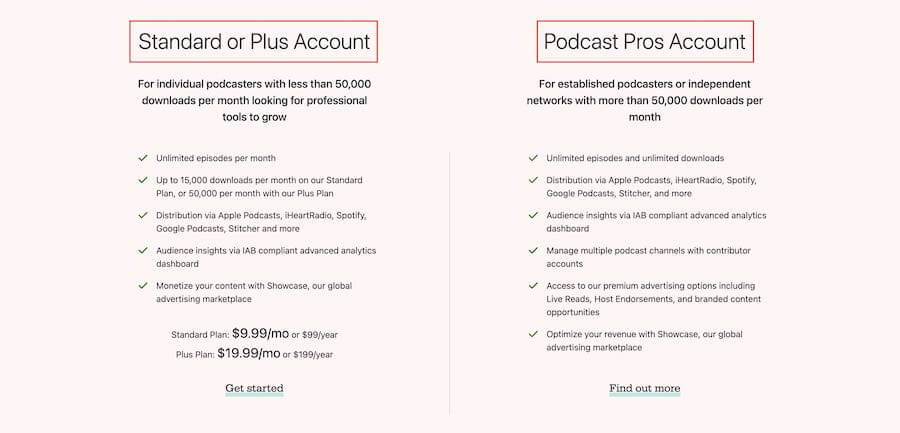
- Unlimited episode uploads per month
- Up to 15k per month with their Standard plan and 50,000 plays per month with their Pros plan
- Advanced analytics that provides breakdowns by geographic area, app, and device
- Embeddable players for a website or social media integration
Overall, Audioboom is a solid podcast host with good monetization features.
What is the Best Free Podcast Hosting?
There are low-cost and even free options you can pick from if your budget is tight.
Many free plans come with limited functionality, but if you’re starting, free hosting services are a great way to test out their features.
You might not be able to host hours of content on your podcast server, but a free trial or free plan can get your feet wet in how podcast hosts work.
Here are my picks for the best free podcast hosting services.
1. Buzzsprout
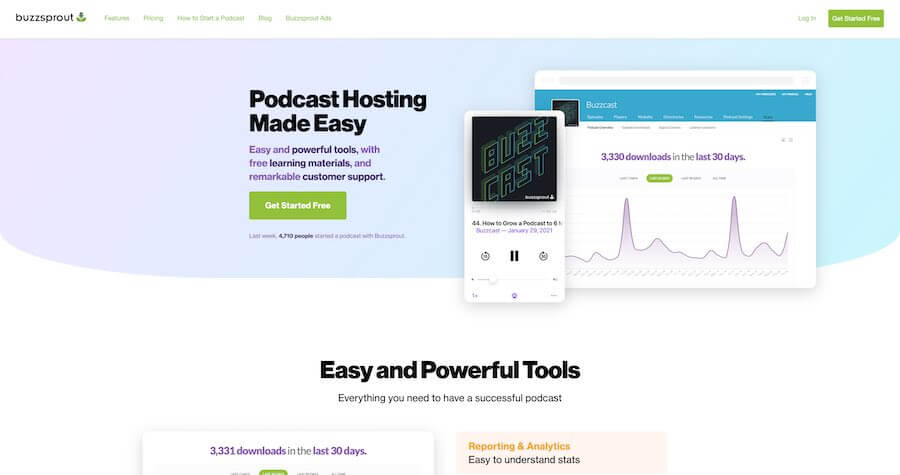
Buzzsprout’s free podcast hosting plan provides the most features compared to every other host on this list.
With their free plan, you get two hours of upload time, hosted episodes for up to 90 days, and a complete podcasting dashboard.
The Buzzsprout free plan is perfect for getting your feet wet and learning the ropes if you are just starting podcasting.
When they say they’re the “easiest way to start podcasting,” they’re not lying.
With Buzzsprout, you can easily upload your file, add them to every significant directory, and start tracking your listeners with their advanced analytics.
Pricing: Free – $24/month
Website: buzzsprout.com
2. Libsyn
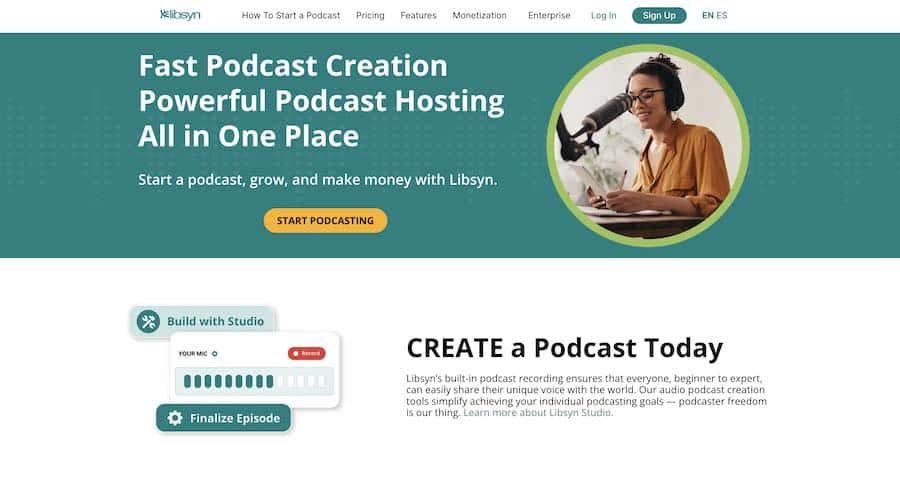
Libsyn is one of the most popular hosts focused on helping everyone from novices to podcasting pros looking to monetize their work quickly.
They are also one of the original podcast hosts, launching in 2004.
With over 35,000 hosted podcasts, 62 million+ audience members, and 4.6 billion podcast downloads in 2016, they are a prominent player in the space.
Like other podcast hosts, they give their users between 50 and 1500MB of monthly storage and provide analytics reports, RSS link generation, premium content, and their app.
Yes, they aren’t 100% free, as their plans start at $5, but I had to add them to the list for that value.
Pricing: $5 – $75 per month
Website: www.libsyn.com
3. SoundCloud
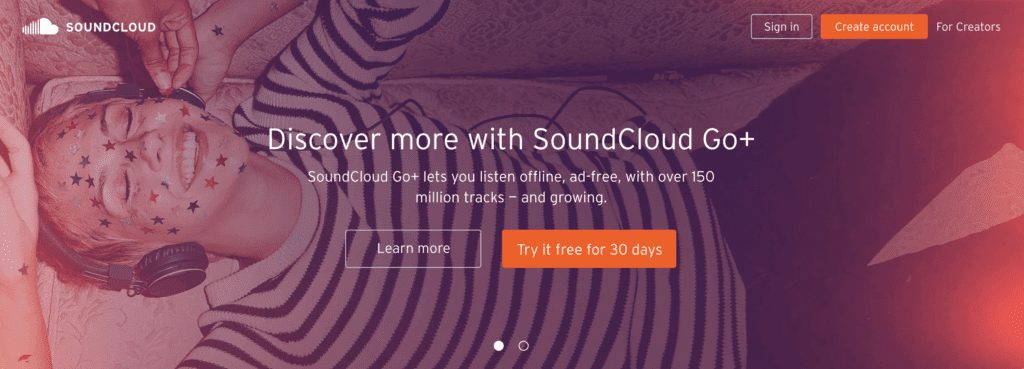
SoundCloud is the world’s largest music and audio hosting site and introduced its hosting platform in 2015.
They boast 175 million unique monthly visitors and an incredible 12 hours of content uploaded every minute on their website.
You can access their embedded players, Twitter cards, and timed comments using their hosting services. You can upload 3 hours of content per month with a free account and get basic reporting.
The more advanced SoundCloud Pro Unlimited account gives you unlimited upload time, scheduled releases, embedded controls, and the ability to pin five podcasts to your profile.
Price: Free to $16 per month ($12 when paid annually)
Website: www.soundcloud.com
4. Podomatic
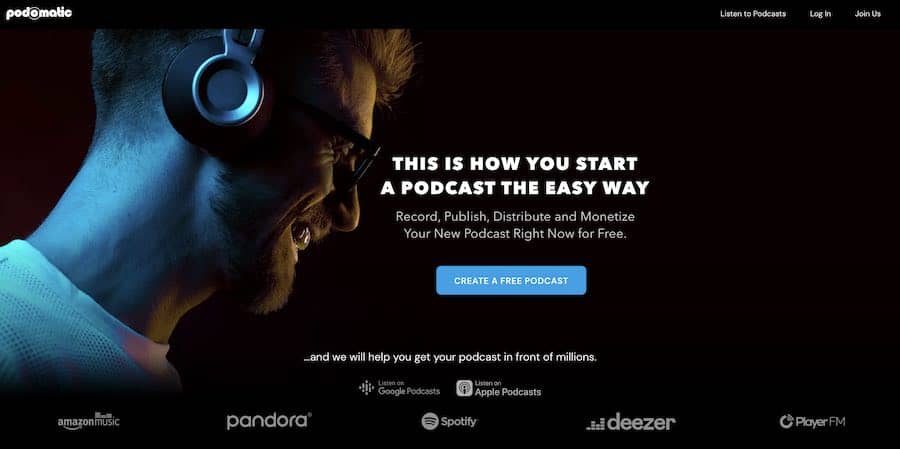
Podomatic allows creators to record, upload, and promote their new audio content all in one dashboard.
One of their strengths is the ability to develop your podcast advertising and crowdsourcing with the help of Patreon and Advertisecast.
Plus, Podomatic has social sharing options, and your podcast can be played directly on Facebook and Twitter feeds.
They are partnered with Weebly to help you create a website and have a free podcast app for iOS and Android.
In addition to their free plan, they have four pro plans ranging from $9.99 to $24.99 per month.
Pricing: Free to $60+ per month
Website: www.podomatic.com
5. Blubrry
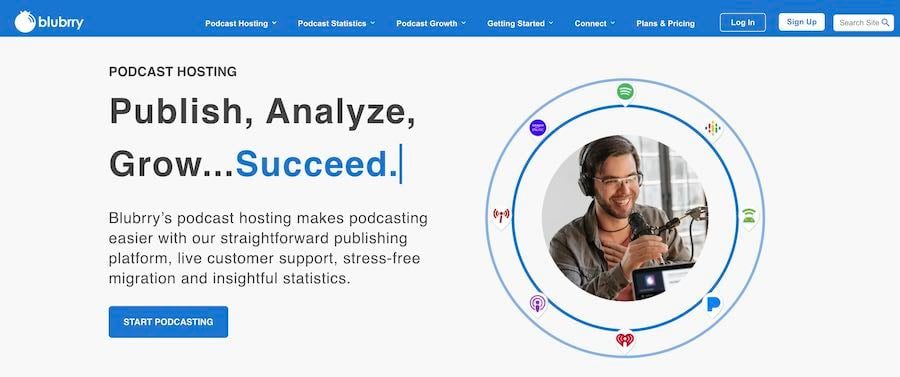
Best WP Podcast Hosting Runner-Up ($12-80/month).
Blubrry is a great podcast hosting service that offers not only hosting but managed WordPress hosting with PowerPress, the #1 WordPress plugin for podcasters.
With over 75,000+ active installs, this plugin is consistently maintained, free to use, and offers SEO options and MP3 tagging.
The Blubrry website says, “Blubrry believes we should provide you great tools and not interfere,” highlighting their creator-first approach.
They offer a podcasting manual, which gives you detailed information on using their services and tips and advice to succeed with your new podcast.
Their lowest cost option is $12/month and offers 100MB storage.
You can upgrade to their professional plan if you want unlimited hosting services.
In addition to their professional plan with custom pricing, they have four paid plans ranging from $12 to $80, which offer anywhere from 100MB to 1,000MB/month of storage space.
Blubrry is quickly becoming one of the top-rated choices because of its customer-first approach.
They are also IAB compliant, according to the Interactive Advertising Bureau.
What is Podcast Hosting?
Podcast hosting provides the file hosting and RSS feed for your podcast.
Hosting companies upload your audio files, tell the hosting platform your show’s details, and generate your feed.
When a user subscribes to your podcast, the podcast host sends the audio files and media to the platforms directly.
Overall, a podcast is a series of audio files that are bundled into a single file.
Naturally, they require a lot of space and bandwidth to be stored.
However, personal website servers don’t have the amount of storage needed for large files.
Podcast hosting sites offer you the space to store your files so that your audience can easily download them.
In the end, it’s a simple setup.
It’s made up of a webserver to allow file downloads, the .mp3 files themselves, and an RSS feed describing your audio file.
The best providers do much more than that.
What Are Podcast Directories?
Podcast directories are services like iTunes, Spotify, and Google Play.
They receive your podcast files, and RSS feeds and push them to their front-end systems.
These directories easily allow your audience to find your show with a podcast app, their computer, iPhone, or Android device.
Here’s how it works.
You upload your audio, and when the directory detects something new in your feed, it downloads the file and displays the latest episode to its users.
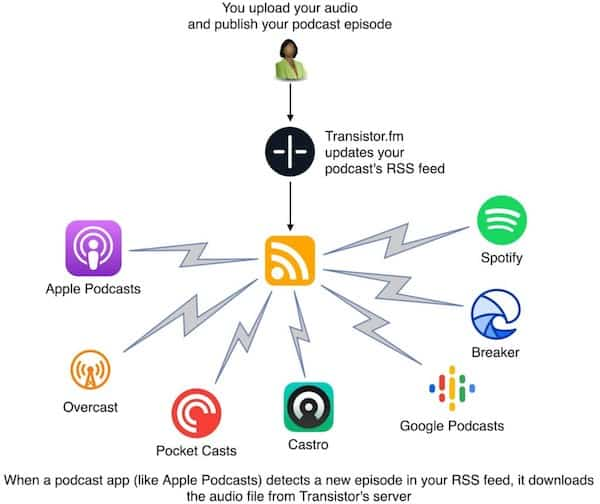
Source: transistor.fm
How Do I Host A Podcast?
You must choose one of the podcast hosting companies in this post to host a podcast.
You can even use a free platform like Buzzsprout to get started testing your show.
Ideally, you have at least a decent microphone and recording software.
But if you want just to test a show or share your thoughts, you can host a podcast with your laptop and free software like Audacity and Buzzsprout.
What Podcast Platforms Should I Publish My Podcast On?
So, how do you release your podcast after choosing a podcast host?
It’s simple.
Once you upload files to your podcast host, you’re ready to decide where you want your audience to find you.
These directories ensure you get in front of the most listeners, and your feeds are updated automatically after each episode.
Here’s a quick list of some of the top podcast platforms.
1. How to Submit Your Podcast Apple Podcasts.
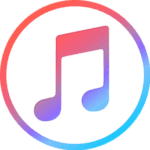
iTunes is one of (if not the) most popular podcast apps. In March 2018, Apple Podcasts passed 50 billion all-time podcast downloads and over 550,000 shows. Impressive numbers!
Here’s how to get your podcast uploaded:
1. Make sure you have an active Apple ID to submit your podcast.
2. Sign in to iTunes Connect.
3. Click on the top-left area of the podcast dashboard and enter your RSS feed into the text box.
4. Your podcast’s information will load from your podcast host and show you a feed preview. Make sure that all of your text and artwork look ready to go.
5. Click submit and wait for the approval.
2. How to Submit Your Podcast to Google Play.

Google Play is another one of the most popular apps, with over 1 billion monthly active users. They also have a new service called Google Podcasts, a way to discover free and trending podcasts.
Here’s how to submit your podcast to Google Play:
1. Ensure you have an active Google account and go to Podcasts in Google Play Music.
2. Click the Publish button, log in to your Google account, and accept their terms of service.
3. Next, enter the URL for your RSS feed.
4. Click submit and check your inbox for a verification email proving you own the podcast.
5. Click publish and wait for approval.
3. How to Submit Your Podcast to TuneIn.

TuneIn is a growing site with over 75 million listeners and over 120,000 live radio streams. They also have a lot of live sports, music, news, and global Internet radio stations.
Here’s how to submit your podcast to TuneIn:
1. Fill out the TuneIn contact form and add your podcast information.
2. Accept their terms and conditions.
3. Click submit and wait for the approval.
4. How to Submit Your Podcast to Stitcher.

Stitcher is an on-demand radio service focused on informational news broadcasts and podcasts.
Here’s how to submit your podcast to Stitcher:
1. Apply on their content provider page and enter your information.
2. Once logged in and approved, add your new show.
3. Add your podcast’s RSS feed and click submit.
4. Wait to get approved.
5. How to Submit Your Podcast to Spotify.

Spotify is quickly becoming one of the largest podcast platforms, boasting an impressive 191 million active listeners and 87 million paid subscribers.
Their premium plan is $9.99/month and allows users to download music, listen ad-free, play any song with unlimited skips, and feature higher-quality podcast audio.
Previously, you couldn’t get your podcast on Spotify within their website. Instead, you were forced to use your host and push your podcast to Spotify that way.
However, that has changed.
They just released their beta program Spotify for Podcasters, where you can learn how to upload your podcast and get started immediately.
All you have to do is log in to your account, submit your RSS feed, and they do the rest.
If you’d like to go the old-fashioned route, this article will help you get your podcast on Spotify as your hosting provider.
What is the Best Podcast Equipment I Need for My Show?
If you’re ready to start recording your episodes, you must purchase some podcast equipment.
You need a computer and a microphone to start a podcast in its purest form.
But that’s like saying all you need to start an e-commerce business is a website – there are many different options.
However, I’ve narrowed it down to the essential podcast gear to get started with items I own.
Here are my top picks for the best podcast equipment for any level of podcaster.
1. Blue Yeti: Best Podcast Microphone.
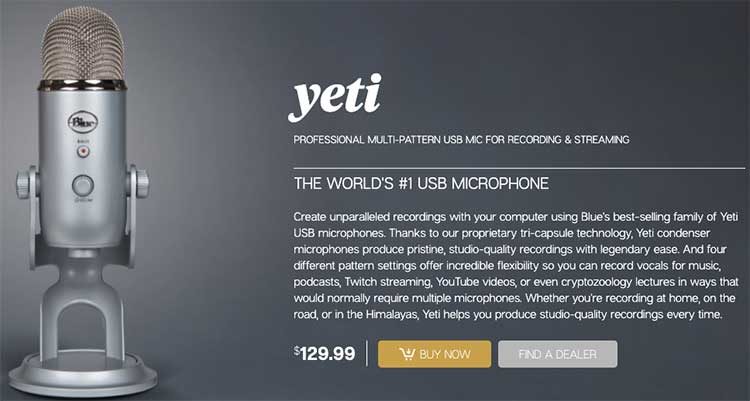
Don’t use your computer’s built-in microphone.
Start with a USB microphone instead – they’re affordable and super easy to use.
Just plug your microphone into your laptop, switch your audio input settings, and record.
The only consideration for microphones is whether you choose a dynamic or condenser mic. Typically a condenser mic is best for one-person shows, and dynamic mics are useful for recording a group.
- A fantastic and highly-rated condenser podcast microphone is the Blue Yeti
- A high dynamic mic is the Audio-Technica ATR2100
2. MacBook Air: Best Laptop for Podcasting.
You don’t need the latest and greatest laptop to start a podcast.
Most computers will do just fine. Ensure your machine was built at least in the last three years.
It will also need to be able to handle your audio software.
I use a Macbook Air, currently discounted on Amazon.
3. Logitech C920S: Best Webcam for Streaming.
If you’re getting into podcasting, you need a good webcam.
The same applies when starting your own YouTube channel.
A great camera is one of the commonalities when deciding between podcasting or YouTube as a marketing channel.
I must say, one thing that podcasters are great at is looking good on video.
Every podcaster I’ve met via Skype or Zoom had a microphone with a boom arm, crystal clear video, and a nicely-designed background in their room or office.
For audio podcasters, a video may not be vital for your episodes but more for meetings with interviewees, influencers, and potential sponsors.
And you don’t have to shell out hundreds or thousands for an expensive camcorder or DLSR camera.
You need a good webcam for streaming in at least 1080p.
1080p and even 4k webcams are very powerful nowadays (and affordable).
The webcam that I use and recommend is the Logitech C920S.
4. Audio-Technica ATH-M50x: Best Headphones for Podcasting.
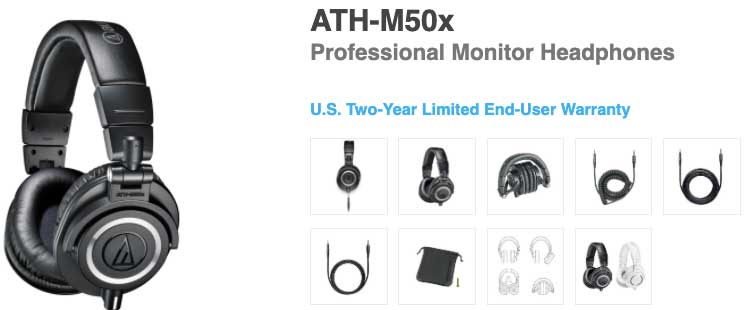
Since audio quality is one of the most critical aspects of your show, a good pair of headphones can listen for p-pops, distortion, feedback, and other issues.
You’ll want a pair of closed-back headphones so that none of the sound coming through the headphones gets picked up by your microphone.
A pair that I like that’s under $150 is the Audio-Technica ATH-M50x professional headphones.
5. Mackie PROFX8V2: Best Mixer for Podcasting.
A USB mixer helps manage inputs, outputs, levels, and effects.
Reverb, flanging, delays, echos, and other effects are fun to mess around with and give your show a professional sound.
My favorite mixer for podcasting is the Mackie PROFX8V2.
What is the Best Podcast Software to Record My Episodes?
After choosing a podcast hosting service and knowing where to publish your show, it’s time to start recording your audio with podcast software.
You can quickly get your media recorded, edited, and launched like a pro with a quality microphone and some podcast recording software.
Here are some of the best software options for recording your high-quality audio.
1. Anchor.
Anchor touts itself as the easiest way to start a podcast. Ever.
And I have to agree.
Anchor’s free podcast recording software allows you to record high-quality audio.
Next, you record unlimited episodes and distribute them to all major websites with one click.
Anchor makes it easy to drag and drop different audio clips to rearrange segments in your episodes.
They also give you a free landing page with a custom URL for your show.
With unlimited free hosting, recording capabilities from anywhere, and one-click distribution, Anchor is the best podcast software on the market.
Try Anchor recording software today.
2. Zencastr.
Zencastr allows new and professional podcasters to record themselves and their remote guests in studio quality right from a web browser.
To record your podcast guest in another location, you send them a link and receive a separate audio track.
This live recording via a VoIP connection connects users through the local microphones.
As the podcast host, you press record, and each person’s audio logs from the web browser, without any compression or artificial sounds, decreasing the audio quality.
Zencastr is also great for collaboration, as you can share your audio files via Google Drive and Dropbox.
With their free plan, you get up to two guests, 8 hours of audio recording per month, and only pay per use in post-production.
If you upgrade to their Professional plan at $20/month, you get unlimited guests and recordings, a live editing soundboard, and 10 hours of automatic post-production every month.
Try Zencastr podcast software.
3. Avid Pro Tools.
Pro Tools is a digital audio workstation (DAW) from Avid Technologies.
It is a high-end audio product with crazy amounts of power.
I remember using Pro Tools in an advanced audio engineering course back in college to mic up and record a live band.
You don’t need this powerhouse to record your podcast.
However, if you want the absolute best tool or studio-quality podcast software, Pro Tools is your #1 choice.
It costs $299 for a 1-year subscription, and you get $850 in bonus gifts, including Pro Sound Effects, tutorials, and royalty-free music.
You can also buy it on Amazon.
If you’d like to check out more software options, check out my guide to the best podcast software this year.
What Are the Benefits of Podcast Hosts and Why Do You Need One?
Podcasting has become a great way to build an online brand and make money from your show.
For example, Joe Rogan’s JRE podcast is estimated to make him an unbelievable $30,000 per episode.

Podcasting is something to take seriously, so don’t skimp out on your host.
Here’re some of the most significant benefits of using podcast hosting sites:
1. No Compromise in Quality.
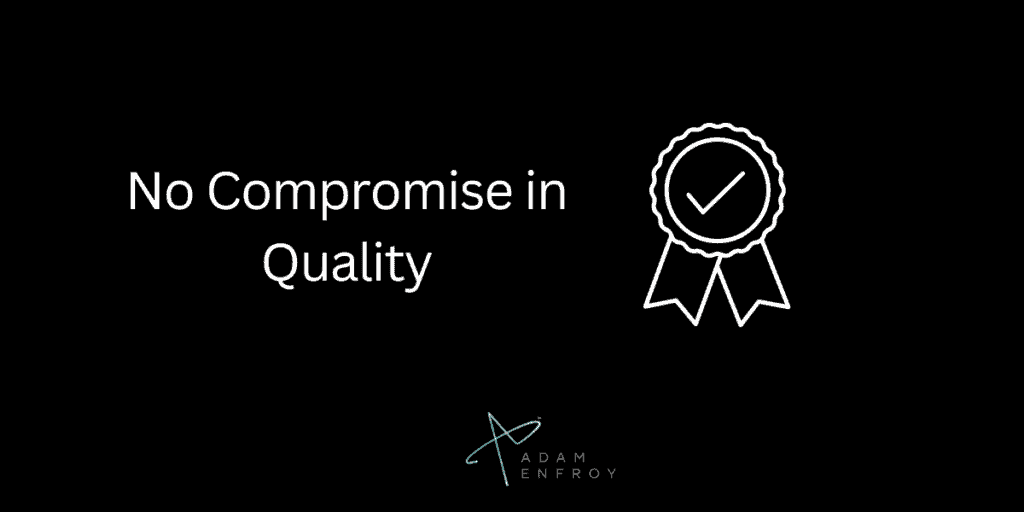
Usually, personal servers have limited space to spare.
If you decide to store a podcast on your server, you’ll have to compromise quality, speed, and storage space.
This leads to deterioration in the podcast quality since you need to cram many files within a limited space.
On the other hand, podcast hosting platforms have inbuilt servers that can host large podcast files while maintaining the highest quality.
This means that you don’t have to worry about quality any longer.
2. Podcast Hosting Sites Can Handle Data Transfers.
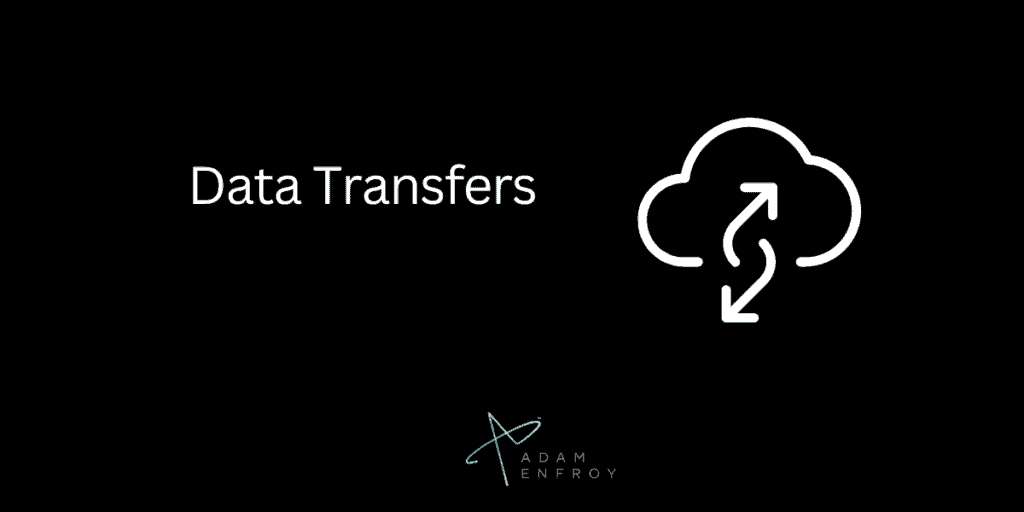
Podcasts are delivered via RSS (rich summary site) feeds.
When you store your podcast files in your account, the users need to download the files directly, necessitating data expenditure for every download.
Now picture this:
You have millions of followers, and everyone downloads files from your account.
It eats up massive bandwidth since your account uses the bulk of the allotted data for your website host. Coming from a single account, it might be too much data transfer for your host.
That’s why leaving it to dedicated website hosts to take care of this for you is a great option.
3. You Save Money on Storage.
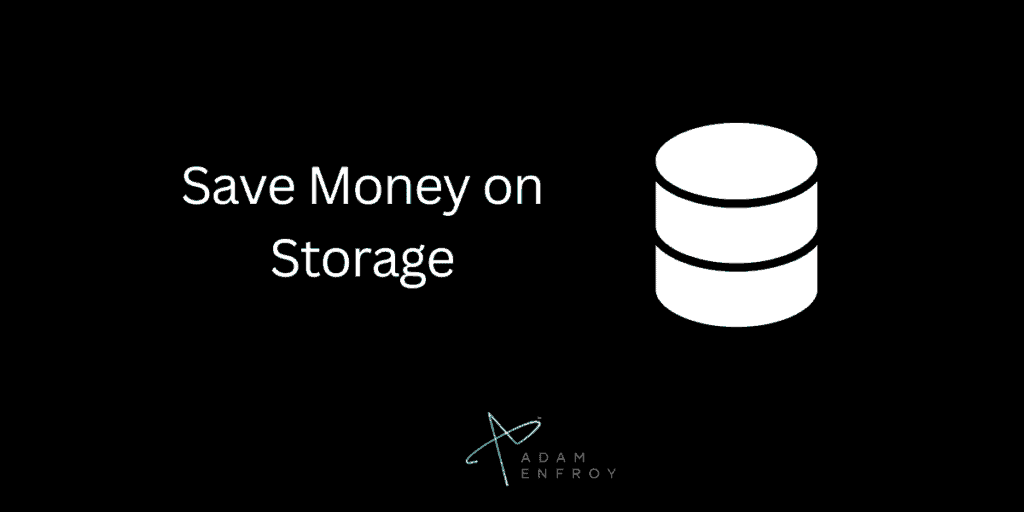
Deciding to host your podcast files yourself can be costly.
For example, to host a one-hour audio podcast three times per week, you need around 200MB of storage space.
And publishing a video podcast once every week at an estimated 500MB per episode, you’ll need 2 GB space every month.
That said, podcast hosts take care of cloud storage for you, which has many advantages.
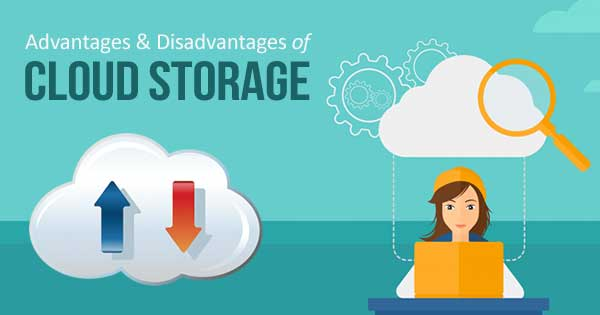
However, if you’ve chosen a host that doesn’t provide unlimited bandwidth and your audience continues to grow, you’ll either need to upgrade your plan or pay the added fees.
Your storage needs will grow with your audience and the number of published episodes.
Luckily, podcast hosting sites come with fixed pricing, so you already know how much you’ll spend based on your storage requirements.
These plans come with reasonable prices compared to your monetization potential, and storage is essential.
4. Faster Speed.
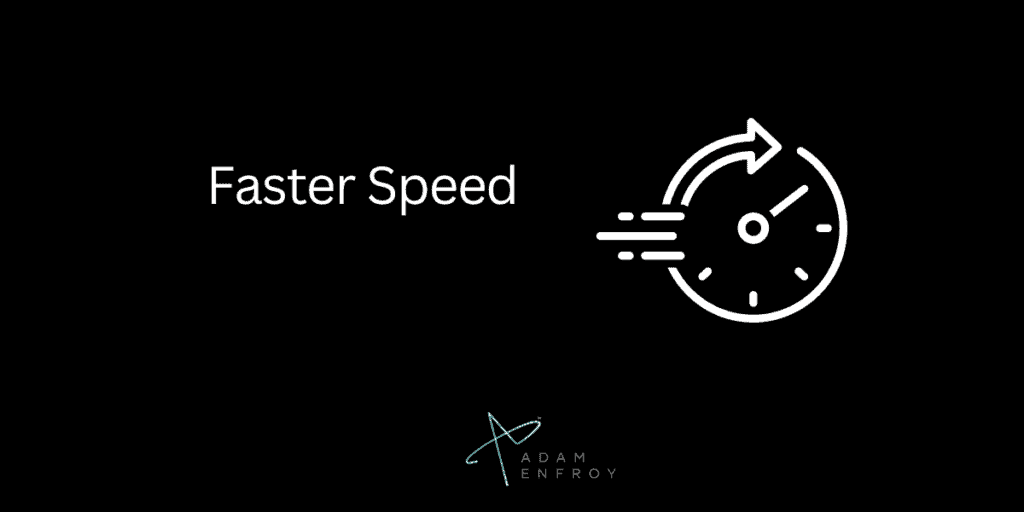
Arguably, an essential aspect of the need for podcast web hosting is ensuring and providing speed.
How long do you tend to wait for a Dailymotion video to run? 1 minute? 2 minutes?
I’d give it only 30 seconds to start playing.
If it doesn’t start, I leave the video.
The same is true for podcasts. Too much buffering or low speeds won’t keep users captivated for long.
Sooner or later, they’ll move on to a competitor’s podcast.
When you host podcasts on your website, speed becomes an issue. There’s only so much speed that an average web host can provide.
When more listeners start to download your podcast, web hosts have no option but to use data throttling.
As a result, users who want to download your podcast will struggle to do so.
Thankfully, with fully dedicated podcast hosting services, you seldom run into these snags.
Podcast hosting sites give unlimited access to your podcasts, as there’s no conflict regarding bandwidth or speed.
5. Robust Analytics.
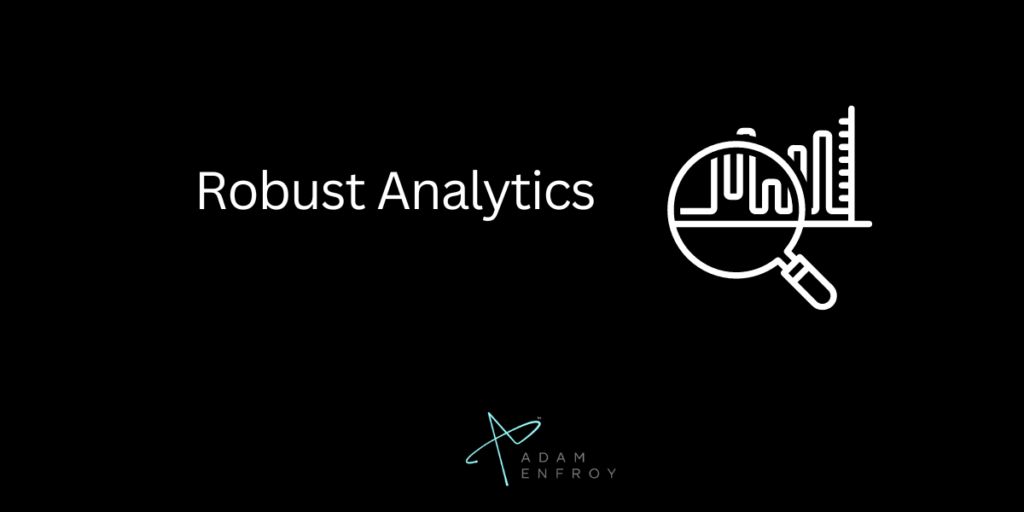
The right analytics tool can help you generate actionable insights and make better decisions.
Before planning your podcasting schedule, you should determine how your podcasts perform.
This is where podcast hosting analytics come into the picture.
Most of these platforms come with an in-built data analytics tool that can help track the number of downloads per episode, how long listeners stay engaged, and where they are located.
This data helps you decide quickly on the content and show formats your audience enjoys.
6. Additional Security.
Cyber-attacks are a severe problem today.
And while running a podcast, you cannot afford to manage your security.
Hosting a podcast on your server requires a state-of-the-art security system replete with security measures like SSL certificates and firewalls.
On top of that, you need to update and test their functionality and perform daily back-ups regularly.
On the other hand, podcast hosting sites come in-built with all the security measures you need.
The tools save and back up your files and ensure security for you.
How Do I Choose from the Best Podcast Hosting Sites?
Twelve million people listened to a podcast for the first time last year. To tap into this growing market and pick the best option, you must consider some different questions.
- What is the right amount of storage?
- How much audio storage and content will you be uploading per month?
- Do you need a new WordPress site or align each episode with a blog post?
- Can you work with video podcasts or any video format?
- What kinds of analytics would you like to view?
- Is it easy to dynamically add advertisements and sponsorships throughout your podcast episodes?
- Finally, how much do you want to spend on hosting services?
These are just a few questions you’ll have to answer when choosing from the best. Consider these questions before finalizing your podcast episode’s cadence and length.
For example, if you’re running a weekly one-hour podcast, you’ll need less storage than running a half-hour show five days a week. However, don’t let prices limit your show’s options.
Here are some tips for choosing the best podcast website:
1. Know how many hours of monthly audio hosting you need per month.
Many podcast hosts only give you two hours of upload time per month, while others provide unlimited uploads.
2. Look into server reliability, bandwidth options, and uptime guarantees.
Look into upgrade options if scalability is essential.
With premium plans, you can access unlimited storage, upload times, and monthly downloads.
3. Research signup vs. renewal prices, as they may differ.
You can also save money by paying annually vs. monthly, so do your homework.
Dive into a free trial to test the product’s ease of use.
4. Make sure the host has a lot of essential features.
Look for no-fault overages, media validation, FTP uploading, and ID3 tagging.
7 Useful Steps to Start a Podcast.
Since the revolutionary release of the iPod in 2001, podcasts have been growing in popularity.
And there seems to be no sign of stopping.
Where do they listen to these podcasts? Everywhere, apparently.
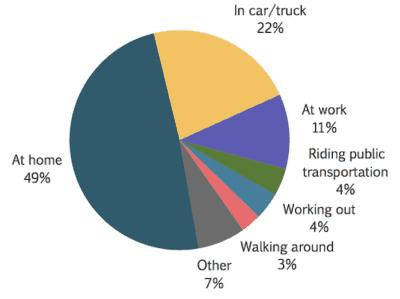
With the popularity of podcasts at an all-time high, there hasn’t been a better time to start your first podcast.
If you want to should you go about starting your first podcast, you need to follow a series of steps, including:
- Choose a name for your podcast
- Select a cover image
- Introductory music
- Get the necessary equipment
- Create an environment and process
- Record your first podcast and release
- Promote and market your podcast
1. Choose a Name For Your Podcast.
There are three significant naming conventions that you could follow to name your podcast:
- Creative – Ex: ‘Podfast’
- Descriptive – Ex: ‘Start Your Blog Like a Startup’
- Personal – Ex: ‘The Adam Enfroy Show,’ #AskAdamEnfroy
The naming convention you choose to follow should depend on your own preference.
For instance, a descriptive name would give a fair idea if you want to highlight your core topic.
Adding a tagline to the name is also something that accentuates your brand value.
For example, ‘Podfast’ – is simply the fastest.
If this doesn’t work, you could try other ways to name your podcast.
2. Add a Cover Photo.
An appropriate cover photo helps create an image of your brand in the consumer’s mind.
It must be communicative and catchy and should uphold the podcast’s niche.
The good news is that a lot of the covert art specifications are taken care of by podcasting hosting platforms. You can also customize them to align with your expectations.
3. Add Your Intro Music.
Begin your podcast with a theme song to captivate the listeners’ interest.
Opening theme music is also an element of the broader branding of your podcast, and listeners will immediately identify your channel based on that music.
Typically, it should be about 5-10 seconds long.
All you need to do is create something unique that aligns with your niche so that your listeners associate it solely with your brand.
4. Get The Necessary Equipment.
For a seamless podcasting experience, you need the best equipment.
The best part is that you don’t need a massive budget to produce excellent podcasts.
The simple basics are:
- Good microphone
- Recording software
- A good podcasting host
Blue Encore and Audio Technica are some of the great microphones in the market.
You can also check out what some popular podcasters are using. For instance, here’s a list of equipment Gary Vaynerchuk uses for his podcast.
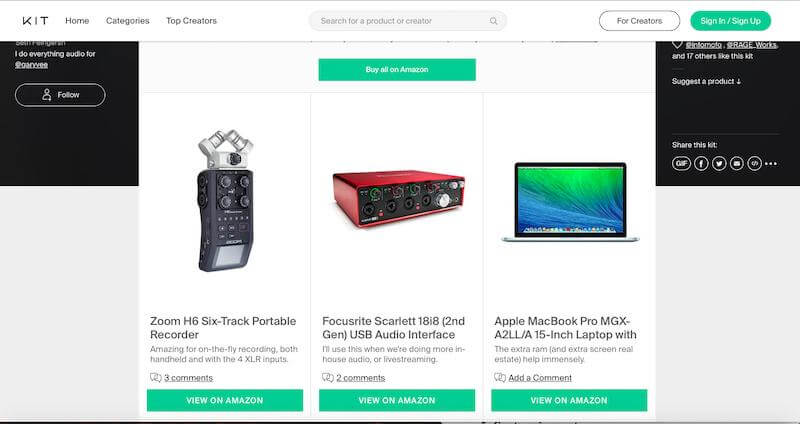
It is easier to produce engaging podcasts if you’re working with the right set of equipment.
5. Create Your Podcast Style.
You’ve got to create the perfect environment to attract listeners.
This is where you need to get creative and market your podcast to reach your target audience.
For starters, you need an appealing welcome message to start the monologue on a positive note.
You’ll talk about who you are and what you aim to do in your podcast.
Once that’s done, now you’ve got to get ready with the content you need for each episode:
- The topic
- Outline of the episode
- Key takeaways
Whether it’s banter, pre-planned segments, or an interview, devising a proper structure for your podcast is essential.
Planning before you start makes for a better performance, which naturally rubs off on your podcast delivery and the other people in the room.
6. Record and Release.
How you want to record your podcasts depends entirely upon you.
Some podcasters record more than 5-10 podcasts in one go, while some believe in producing one podcast at a time.
I’d suggest using this format for your podcast editing:
Teaser + Intro + Podcast + Advertisement + CTA + Podcast + Subscription Reminder + Outro
To reach the right audience, you must upload your podcasts on popular platforms like iTunes, Soundcloud, Google Podcasts, and more.
Even better, if you already have a YouTube channel or a blog page, you can also share your podcast on those channels.
You can also invite regular viewers and readers to check out your new podcast.
7. Promotion and Marketing.
It’s challenging to record many streams immediately after you start.
Using social media sites like Instagram, Facebook, and Twitter and running ad campaigns could be an excellent way to promote your podcasts in the market.
You can connect with industry leaders and tie up with radio stations to spread the word at a reasonably lower cost.
You can also invite celebrities or industry experts with considerable followings to your show.
That’s a great way to reach out to new listeners.
Starting A Podcast With No Money
Starting a podcast with no money is certainly possible.
First and foremost, you need to have a plan.
Before starting your podcast, you must consider the show’s purpose, your target audience, what topics you’ll cover, and how often you’d like to release new episodes.
Having an idea of what kind of content you want to create can help keep your podcasts organized and consistent for your listeners.
Once you plan, it’s time to start researching the best free podcast hosting sites.
There are many options available that offer features such as unlimited storage space and fast download speeds.
Some platforms even let you embed audio files directly into websites or blogs so people can listen from anywhere without leaving the page they’re on.
It’s important to research different platforms before settling on one to ensure that it meets all your needs and expectations.
In addition to finding the right platform for hosting your podcast, it’s also essential to use professional-quality equipment when recording and producing audio content.
While using basic software programs like Audacity is adequate for most podcasts, investing in higher-end software such as Adobe Audition or Pro Tools can make a huge difference in sound quality and production value.
Of course, plenty of free alternatives are available if you want to avoid investing in expensive software programs.
Finally, remember to market your podcast!
You can reach potential listeners by joining online communities where people discuss their favorite podcasts or similar topics related to yours, participating in relevant conversations on Twitter, or simply emailing friends and family members about your show.
Social media is a potent tool for promoting podcasts since users are accustomed to sharing content across various channels.
If they enjoy listening to an episode of yours, they may even retweet or post about it on their pages which helps spread awareness even further!
Podcast Hosting FAQ.
Is starting a podcast worth it?
Starting a podcast is worth it if you have all the necessary and unique skills for podcasting.
You need to be a great speaker, entertainer, self-promoter, and digital marketer and be willing to spend a lot of time marketing your podcast and building your audience.
Also, spend some time writing a podcast script that actually engages your audience.
If you started a podcast solely to make money online, there are some more accessible alternatives out there, like learning how to start a blog.
However, you can be successful, but the odds are stacked against you.
The vast majority of podcasts aren’t successful because podcasters don’t have the
digital marketing knowledge or relationship-building skills to make them successful.
Where can I host a podcast?
To host a podcast, there are plenty of services to choose from. You must host your podcast with one of the best podcast hosting companies. Here are my top picks:
1. Buzzsprout.
2. Spreaker
3. Transistor.
4. PodBean.
5. Simplecast.
6. Captivate.
Where can I host a podcast for free?
Yes, you can host a podcast for free. However, free services come with many limitations compared to their paid alternatives. When you start a podcast and need to host your audio files, you should pay for a high-quality option rather than a free, less feature-rich alternative.
Do I need podcast hosting?
Yes, you need to choose one of the podcast hosting services I recommend to store your files and publish them on platforms like iTunes and Stitcher. Unfortunately, you can’t just record an audio file and upload it directly to iTunes or Stitcher – you need a podcast-hosting company to manage that for you.
Can you make money podcasting?
Yes, you can make money with a podcast, but you must build an audience first. Once you build an audience, you can’t profit from sponsorships, affiliate marketing, and product sales.
The primary way to make money with a podcast is to sell sponsorships (ad slots) to companies that want to be mentioned on your show. You can sell these slots in increments of 5, 10, 20, or even a whole year to make sure your slots are filled.
Another great way to make money is to partake in affiliate programs. By mentioning a webpage to visit over the air and linking to it in the show notes, you can drive sales for other companies and make a commission.
How often should you publish a podcast?
Your niche, audience, and length of each episode should dictate the frequency of your publishing schedule. You must provide the best possible experience for your listeners and ensure they keep returning for more.
For example, if your episodes are only 15 minutes long, you may want to publish a daily podcast. You can get away with a weekly podcast if your episodes are longer (60 minutes or more). Ultimately, it depends on your industry, topics, and audience base.
Can you have a podcast on YouTube?
Yes, starting a podcast on YouTube is possible.
It combines two popular and influential media platforms – audio and video.
Wrap Up.
There you have it – my list of the best podcast hosting services to try this year.
When making your choice, first dig deep into the platform’s features.
You should be able to upload as much monthly content as needed, be compliant, view analytics, and have enough storage space.
Second, decide if you want free unlimited hosting or are willing to pay extra to get more features.
Third, do you need a new website?
Look for options that couple web hosting with WordPress or Weebly so you can add show notes and blog posts. Ensure your hosting company works with the best podcast networks.
Finally, examine which hosts can promote you with marketing, crowdsourcing, ads, monetization, expert guidance, and support.
These companies take the guesswork out of storing your podcast, distributing your audio content to the right places, and supporting you on your podcasting journey.
My recommendation for new podcasters is to get started with Buzzsprout and get a free $20 gift card.
So pick the best option tailored just for you, and happy podcasting!
Further Reading on AdamEnfroy.com: Check out my complete guides on how to start a podcast and the best podcast software to record and edit your shows.
You can also read my full Buzzsprout review for more information.
And if you want to incorporate video into your monetization strategy, read my reviews of the best online course platforms.
Last Updated on February 4, 2024 by Adam Enfroy
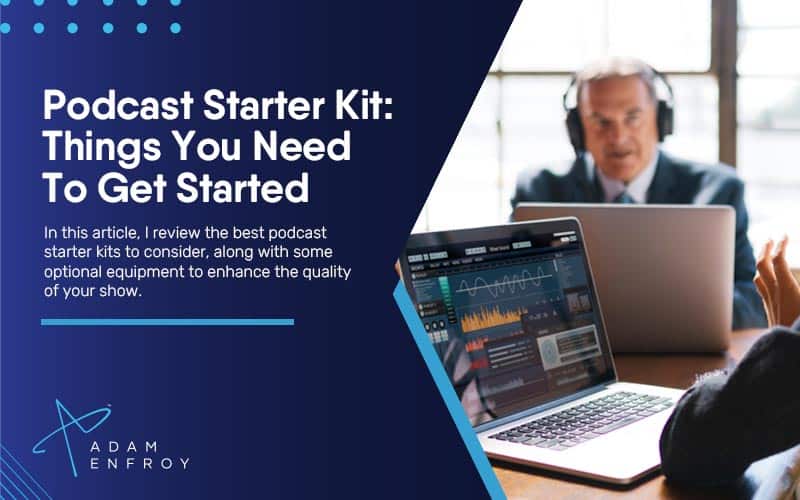
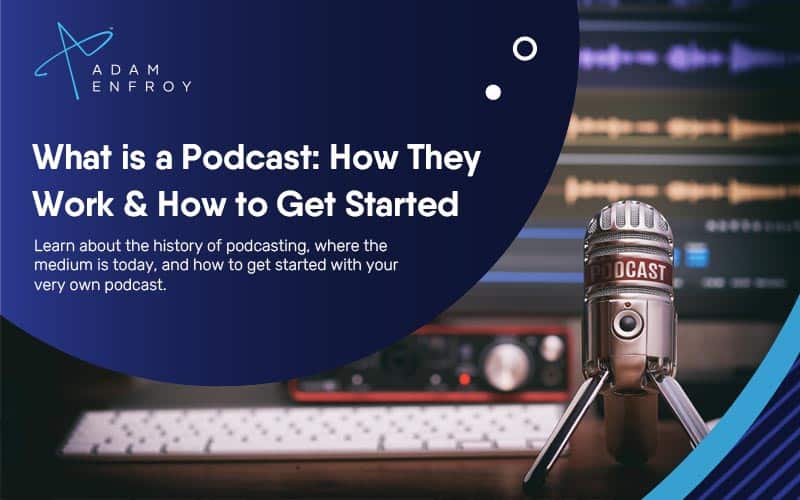
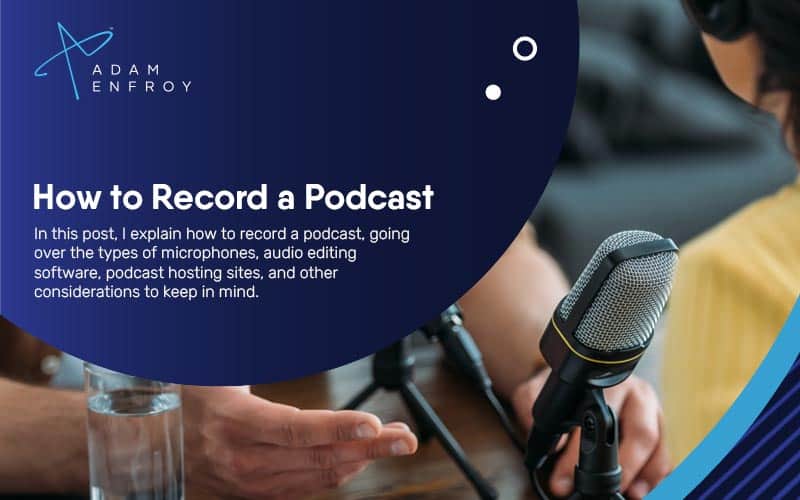
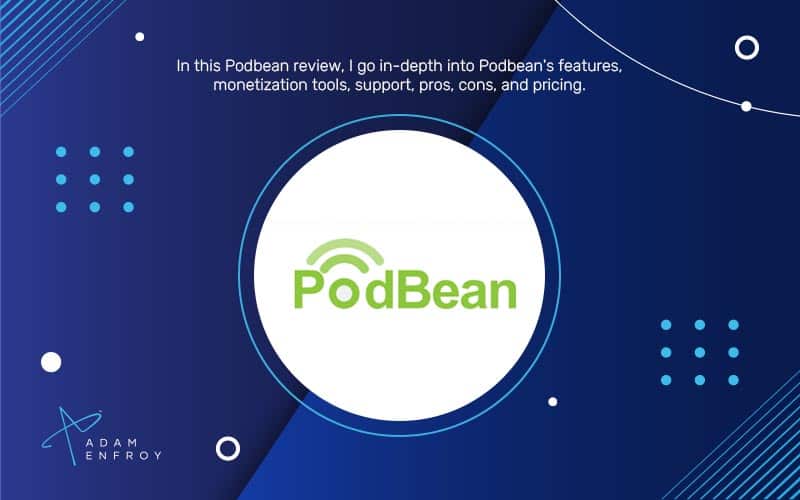
Thank you so much for this blog (I am tempted to call it a course).
Super informative!
Thanks
I am tempted to start a podcast but did not have the technology nor have any idea how (you would be right in assuming that I am an older ‘baby boomer’ and don’t understand today’s tech stuff, but I am preparing to do it.. This has been a great post for me. Thank you
Hey Kevin – glad it helped out. Good luck with your new podcast!
Adam, what aa super comprehensive list.
Thank your for taking the time to write it…. you have helped me a lot…
I am going to start a podcast soon and was heading for Buzzsprout. BUT.. thanks to your detailed post I have decided I am going with Simplecast.
I had never heard of them before I read your article.
They seem to have the write combination of the things I need for the right price point.
And their how to videos are excellent.
I am currently trialling another product, not on your list but I have changed my mind.
Simplecast is exactly that…. simple..
Best Wishes from the UK
Jackie
Great stuff Jackie – good luck with your new podcast. 🙂
Adam, it’s a great…help me out to choose podcast host finally
Best wishes from the Indonesia
Ismet
Thank you Ismet 🙂
Really great list thanks for posting Adam!
Thanks Alan!
I tried to use Spreaker and just could not make it work. Their communications skills are very poor. I struggled with all sorts of issues. I realize that I am dumb about technology, but I have had a blog up and running for several years and do lots of other things on the internet, so I am not a total idiot. They reached out to me in a friendly way, but their helps were still not helpful. As one example, I worked for probably 30 hours to get a logo ready and uploaded. I finally got it done and went on to other things. Then I found that my logo was not anywhere to be found. That’s when I deleted my account.
really appreciate this info, thanks a lot!
Hey Adam,
This is really great. I don’t do podcasts but, I did my research on podcasting to help one of my clients. Your article covered almost everything we wanna know about Podcasts.
So, just wanna say thank you.
Hi to all, the contents existing at this web page are genuinely remarkable for people experience, well, keep up the good work fellows.
Hi Adam, Im a college student at Creighton University. There was no broadcasting club available on our campus so my friend and I decided to make one. We are going to upload once weekly. What plan do you think we should use? I was thinking the Podbean Unlimited. It seems cheap and also if we wanted to upload more we could. It would let us generate RSS feeds to put on the apple podcast app right?
Hey Blake, thanks for reaching out and that’s awesome you’re creating a broadcasting club. Yes, since you’re uploading once/week I’d go with the Podbean Unlimited Audio plan or the Buzzsprout. Alternatively, you could go with a Buzzsprout plan depending on how long each episode will be. Both can generate RSS feeds that work with the Apple Podcasts app. I hope that helps!
If you’re looking for a podcast host – heads-up! Just want to warn anyone against using Spreaker. They will bill you a renewal without warning for a year in advance and then flat out will not refund the pre-payment, even if you have moved your podcast a year ago! Highly unfair to charge for services that are not rendered, and to treat customers so badly. Warning – stay away from Spreaker! Libsyn is MUCH better!!
OUTSTANDING!! I mean “out” standing!!!
I’m so new to podcasting I can’t justify calling myself new. I’m reading & researching and this article told me ssssoooooo much!
Thanks very-much!!!
This is a very wonderful post. Thank you Adam
This is so thoroughly informative. Thankyou!
Thanks for sharing. It is a very helpful content.Your blog is so amazing.
Thanks Again.
Hey! Great read man.. I’m an old fart, but am going to get into podcasting in the very near future! The info you published is invaluable to me, thank you so much for taking the time to put it down in print! Have been wondering just how to go about getting started, and you have taken so much of the guesswork out of it. I am not ready to get it started just yet, there are a few things I need to purchase first, but when I do, I would be thrilled if you would agree to be on my show!
Really amazing your content. I was just looking around this post but as an SEO expert, I am impressed with your traffic growth.
Adam, excellent article. I have done a lot of researching, reading, and prepping. I have a topic and URL, will host my own supporting (info) website–I have others. However, you just gave me an awesome reeducation on podcasting itself before I pulled the trigger. One small issue for me though: I could not tell what gave one option the advantage over another: i.e. first v. second, or fourth v. fifth. If/when you edit this post, you may want to make that a bit clearer.
Hi Adam, Thanks for your suggestions on best podcasts. This info really helped me, just now I registered on Buzzsprout and going with $24/month plan.
Way cool information!
It really helps me narrow down a hosting platform for my new podcast, The Poddy Break.! Going to try and get it up, and running this week, so this information is coming in real handy.
Thanks, and have a great New Year!!
Chris
I truly appreciate this post cause you helped me figure out where I want to put my money to build. i been thinking about this for a long time and been quite decisive…
I’m glad I read your article.
This post helped me to understand which one I should choose. Thanks, Adam!
Hello,
Thank you for your article! Already create profiles at some of these sites. hope it trial period will help to decide what works best for me.
Hey Noah – that’s a great idea and what I typically do too. I think it’s good to test them out with a trial to see which is best. 🙂
This is really great.
Thank you 🙂
This is such a great resource that you are providing and you give it away for free.
Hi Adam, thank you for this very helpful article! I’m a high school teacher, and during this period of social distancing, I’d like to start a podcast for my students. I’m looking to have a separate channel for each of my four classes. What platform would you recommend to do this as inexpensively as possible? Thank you!
Hey Nathan, I’d go with Transistor.fm. They let you host unlimited shows on the same account. 🙂
Great, thank you so much!
Hi Adam, great article, thank you. What I’m not clear on is how it’s possible for an individual to make money from podcasts. Any tips?
Hey Lindsey, great question! The most common way to make money from podcasts is via sponsorships. Podcasters typically have media kits that show the cost for individual ad slots. Ad placement could be at the beginning, in the middle, or at the end of the show. Most podcasters also sell based on packages so that their ad slots are always full – for example, 5 episodes, 10, 20, etc. Another way to make money is by promoting affiliate products and linking to them in the podcast description and on a blog if they have one. Overall, it takes some time to make money from a podcast as your income is directly correlated to your audience size.
I appreciate your efforts. Great list. Thank you for sharing it with us
Hey Adam,
What a piece, which am also tempted to call a course.
Very many thanks for taking your time to share your in-depth researc on podcasting. This has really helped me alot as a podcaster and I cant thank you enough.
You have left no stone unturned as you have thoroughly combed through the podcasting space.
Stay Blessed.
Shephard254
This is an excellent list. I appreciate your research and experiences. Thanks for sharing this list with us.
This is a great list. I would add Libsyn and Anchor to the mix. I have 3 podcasts, 2 on Libsyn, 1 on Anchor. And my son has 2 podcasts – 1 on PodBean, 1 on Anchor.
I am tempted to start a podcast but did not have the technology nor have any idea how (you would be right in assuming that I am an older ‘baby boomer’ and don’t understand today’s tech stuff, but I am preparing to do it.. This has been a great post for me. Thank you
Some of the sites are really helpful.
Thanks for the article..keep writing 🙂
Hi every one
I need a place to publish my podcasts that I have recorded about medical science.
Do you know which podcast host is specially do it. I mean which podcast host is specially about medical things.
I will be happy if you help me
Thanks
Hey Yaser, good question. All podcast hosts should work fine for creating a medical podcast. You just need to make sure to read up on adding disclaimers to your podcasts. For example, if you Google “medical podcast disclaimers” you can find a lot of good examples. You’ll need sentences like:
“Do not rely on medical information contained in our podcast, and you should consult a licensed physician in your state for matters related to your health. You hereby agree that you shall not make any health or medical-related decisions based in whole or in part on any content contained in our podcast.”
This isn’t comprehensive so make sure to ask a lawyer if you have any questions.
I used to host my podcast with WordPress and Smart Podcast Player for years now.
Just recently switched to Simplecast as the host and Podcastpage.io for the website, cut my costs in half.
thanks, Adam, for the great list of posting. All the best for the next podcast.
When I started podcasting back in 2010 or so, there weren’t too many resources like this on the Internet. So it’s great to see the growth in terms of community support for podcasters. We’ve got to help each other out for the industry to mature.
You’ve got a lot of unique information here. Great job in putting this together, especially with the visuals.
Super helpful post. I was sure to check that your affiliate code showed when I signed up for Spreaker!!!! Gracias!